#because i keep forgetting to do any politic vision quest believe it or not
Text
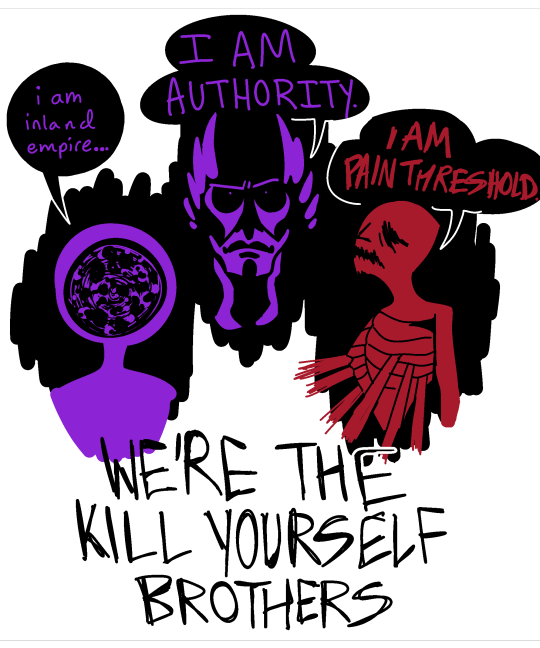
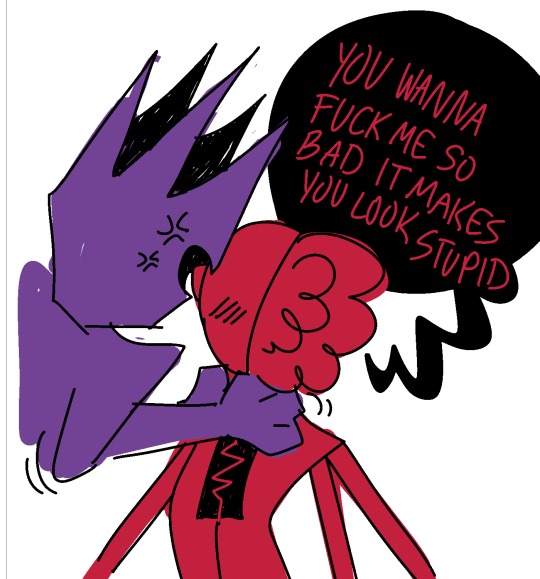

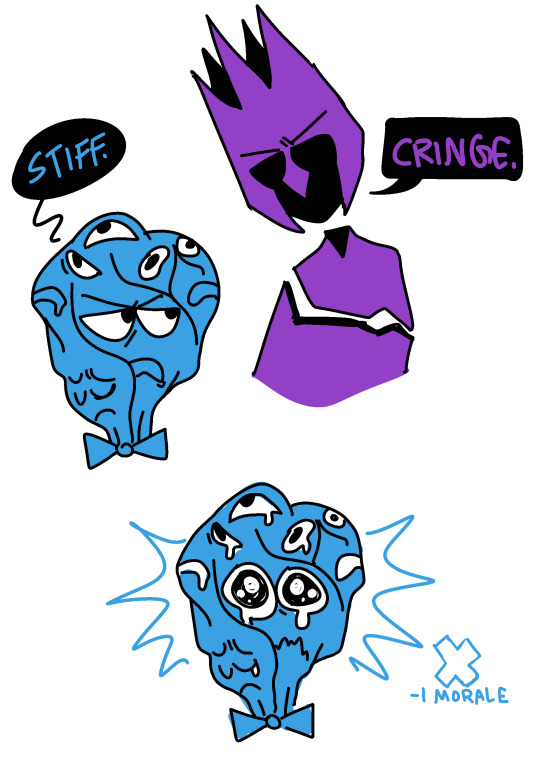
as expected, i will now be contributing to the disco skill meme economy
#disco elysium#suicide joke#disclaimer i dont think of them as brothers its just for the meme#since the next meme is yaoi. yeah#and yes drama has a little bowtie now#bc of the +2 drama bowtie.... idk#wrong again nerd is real dialogue electro has the best lines#i played this game 2 times and im gonna play it a third and possible fourth time#because i keep forgetting to do any politic vision quest believe it or not
605 notes
·
View notes
Text
Tangled Salt Marathon - Happiness Is
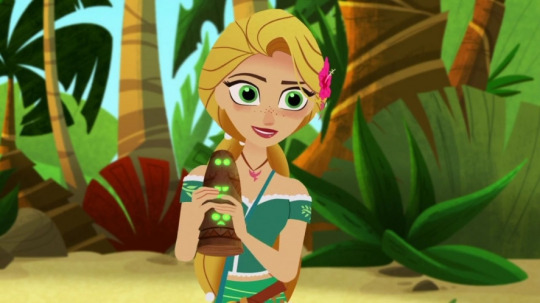
This is possibly my favorite episode of season two. Yet, it is also the point the where the series starts to fall off a cliff. Only that’s not something that you would realize upon a first watch; just in hindsight and only with some basic knowledge of the behind the scenes drama that led to this and the fall out with the fandom that followed afterwards.
Summary: Rapunzel begins to feel homesick for Corona when she finds an old letter written by her father in one of the many lanterns sent from her previous birthdays. In attempts to uplift her spirits, Rapunzel explores the island and comes across a magical idol that brings instant happiness to whomever possesses it. Rapunzel begins to hallucinate her family and friends back in Corona and soon shares the idol with the rest of the group. However, everyone starts to become obsessive over the idol, desperately wanting it for themselves. Rapunzel tricks everyone into giving her the idol, but when the Lorbs try to help Rapunzel, they fall under the idol's control and soon begin to terrorize the village.
Let’s Start with the First Elephant in the Room; Frederic
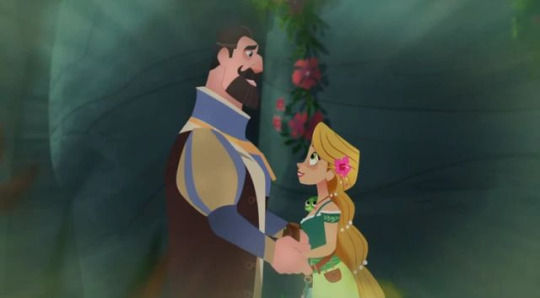
So throughout the episode Rapunzel is struggling with being homesick. Which is fair enough, that’s an understable reaction to being on the road for months by now. However, to showcase this Rapunzel keeps seeing hallucinations of her father. There are some other characters too, but her dad is the first person she sees and the only one in Corona with speaking lines. He’s the one to tempt her with the idol.
Did we just forget that Frederic is her abuser?
Look, even if you accept his apology in Secret of the Sundrop and believe he has learned his lesson, that doesn’t just erase the pain he caused her. Her thoughts about her father should be more realistically complex then this. Now add in how she makes a such a clean break from her other abuser, Gothel, but still holds him on a pedestal shows a disturbing bias on the part of the writers.
Also where’s this love for Arianna? You know the only real mother on the show? The show that’s aimed at little girls? The one parent who hasn’t flat out abused the main character yet?
Seriously, Chris, what the fuck?
This is a Missed Opportunity
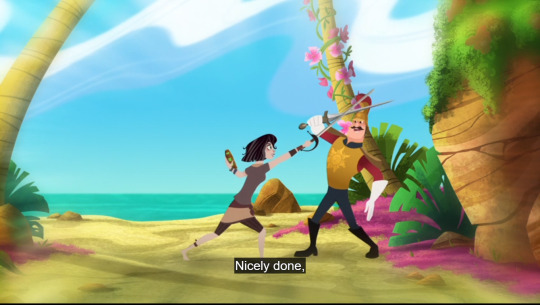
So part of the reason why I like this episode is that we get insights into each of the characters and their desires. As such this is one of the few episodes where the group actual feels like a group friends. However, Cass’s vision is wasted here.
So at first glance this seems to aline with what we know of the character thus far. She loves her dad and wishes to impress him. That’s only if you take season one into account, though. Later episodes will contradict this goal. If you wanted to set up praise and validation in general as Cassandra’s motives, then here is where that should have happened.
Show her getting a medal, have cheering crowds surround her, have her be a hero, or something. You can’t claim her relationship with her parents as the driving force of behind her later actions if you don’t actually involve one of those parents as part of the resolution to her arc.
Either she lacking attention from her dad or she’s jealous of Rapunzel. You can’t have it be both because those two things don’t intersect. Rapunzel is not and never was a threat to her relationship with her father.
So Umm...I Don’t Think This Plot Point Has the Impact That the Writers Think It Does
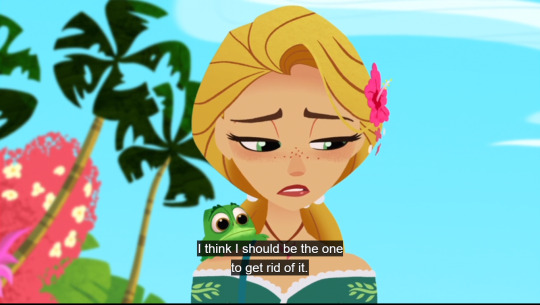
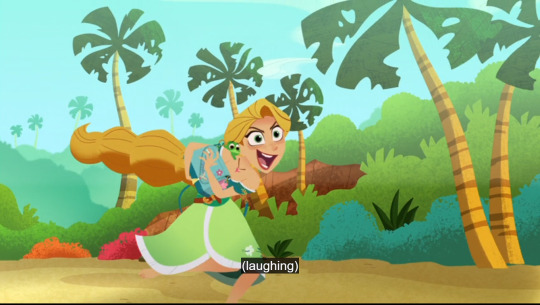
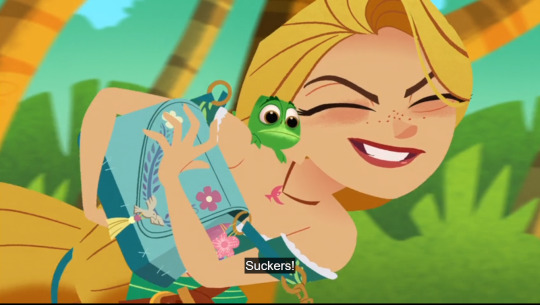
So this hilarious, and it is intended to be funny, but it’s not for the reasons that the show gives.
The idea is that this is some shocking revelation. That Rapunzel would never do this under normal circumstances and it’s a hint that the idol is corrupting her.
Only the rest of the series doesn’t aline with that at all. This is just the real Rapunzel behaving as the she normally would but without the usual veneer of excuses.
It’s funny because it’s the show calling out Rapunzel hypocrisy for what it is plainly, not because it’s out of character.
But funny only gets you so far. The show is perfectly happy to play up Rapunzel’s awfulness for laughs, but then conventily ignore it when it comes time for the characters themselves to call her out on it so that she can grow and learn.
The show runs under the sitcom idea that comedy excuses all sins; which then backfires horribly when it tries to be serious and mature.
You can’t joke that the king threw a random person in a stockade for little reason and then expect us to still like him when he persecutes a child. Same applies here.
The sitcom set up only works when there is minimal at stake and all parties involved are equally awful in their own ways.
Then Why Not Just Go Home?
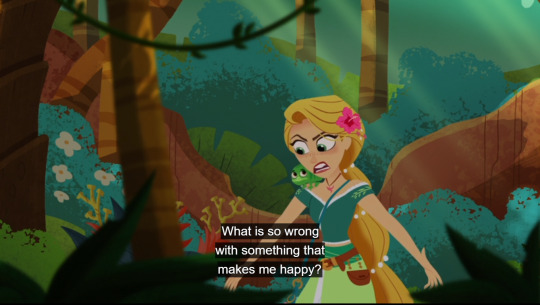
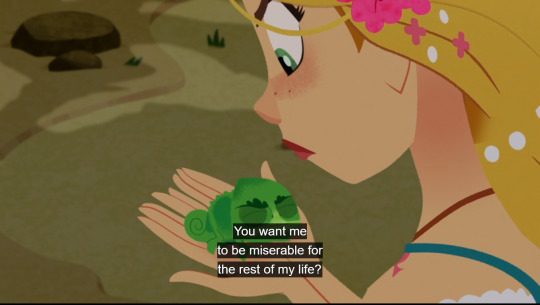
Once again, there’s nothing at stake in season two. Rapunzel has no real reason to be on this trip. Nothing is stopping her from just going home if that’s what she wants. The idol only makes her happy because it shows her want she wants, but she could actually have what she wants as soon as the next ship arrives. So what’s the issue here?
This is why you need external conflict in order to make internal conflicts work. There’s has to be something preventing the main character from achieving her goal or otherwise she just comes across as a dumbass.
And Now Here Comes the Second Elephant; Varian
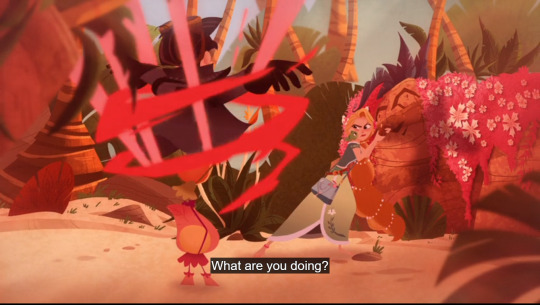
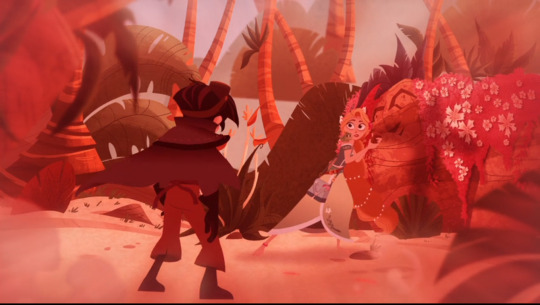
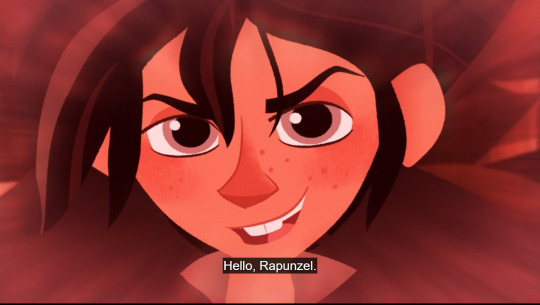
I have several things to talk about here, and none of them actually concern the scene itself but the creator’s treatment of the character and the show’s fan base.
For you see, Chris did a very, very stupid thing.
He wrote the character driving the plot out of the show. The character who also happens to be the most popular person in the series. Only to then use said character’s VA and this one cameo as promotion for this whole season.
Needless to say, fans were disappointed.
However, the Tangled fandom is exceedingly polite; more so than most. The lack of Varian was met mostly with confusion, and maybe a few off handed jokes, rather than anger. When opportunity arose people naturally had questions concerning the character.
And that’s when Chris put his foot in mouth.
This Tumblr post details how Chris got kicked off the Tangled The Series Discord by bullying a bunch of Varian fans while on there.
https://starxapple.tumblr.com/post/617852117763391488/zhantiri-uuugh-fine-since-people-are-getting
I shan’t get into it fully, but for those who discovered the show after season two had aired, this caused a massive backlash from the fandom.
A good chunk of the fandom just walked away, and rightly so. The few that stuck around despite these remarks found themselves harassed by certain sections of the fandom who saw Chris’s bullying as permission to pursue the same behavior. However, most importantly, the ratings plummeted.
Season one hovered around the the 1 million mark, give or take a five point difference. The first part of season two dropped to half of that, and after this episode and the hiatus it sunk even lower, down to the mid-thirties. That’s over 20,000 people who just jumped ship over this. That’s not a normal decline.
No matter what your personal feelings are of the character of Varian or how he was handled in the show, that’s still a massive PR fassico that cost the series big time.
To add to this mountain of bullshit, there was also a massive walk out of crew members after season one had finished production. Most of them women. They even desperately threw out ‘we’re hiring’ calls to cover this. Which given that’s it’s Disney and that nepotism is usually how one gains employment in the entertainment industry, something unusual must have happened behind the scenes. Especially if most of the people who left were women.
We’ll probably never know what really happened. People don't usually talk about behind the scenes stuff like that due to contracts and the aforementioned nepotism. However, all clues point to Varian.
Something changed at the last minute concerning his story. Chris himself had confirmed as much when discussing the note and the Brotherhood. We also gotten other hints that content was edited out at the last minute. Plus the writing becomes more shoddy as the series goes along, showing how slapped dashed everything is together.
Then there’s the rumors.
I must stress to you that this is only a rumor. As pointed out earlier, most animators aren’t in a position to talk freely about what goes on behind the scenes. Do NOT harass them over it or make things awkward by asking them to clarify this. However it’s been suggested that the female crew warned Chris that removing Varian from season two and re-writing his story, along with making Cass the villain, would be a bad idea before they left and Chris didn’t listen. Much to his folly.
Chris is no longer a Disney employee and has yet to move on to any other projects. He says he left, but I more suspect that Disney just didn't renew his contract and no one has picked him up since. I take no joy in the idea that someone may have lost their job, but if true, then Chris has little to blame but himself.
So What Did Change?
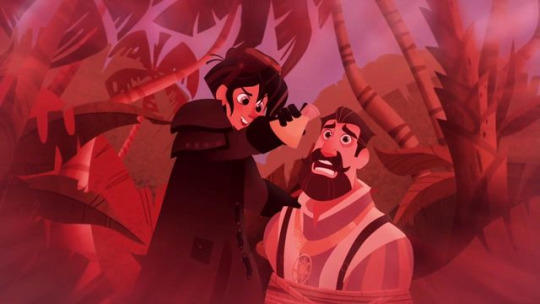
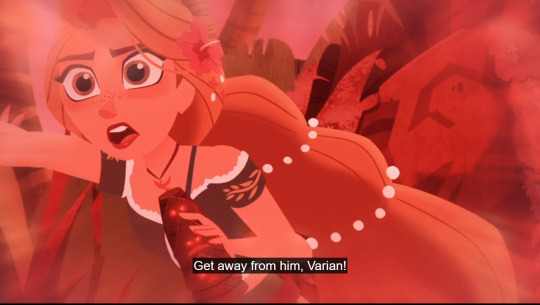
We don't know anything for sure. We know from discussions about the note that there was a proposed Brotherhood plot that involved Varian that was then cut. There was also talks about a Cass and Varian team up in season three.
This was then changed to the Saporian take over, which is foreshadowed in this scene. However even that got edited down and under the flimsiest of excuses.
One of the writers, Ricky, suggested that they thought cutting back to Corona would be too confusing for the audience; which is a load of bull. I mean how poorly do you think of your audience’s comprehension skills that they wouldn’t understand a change of scene or a flashback? Yet you fully expect them to pick up on your lazy foreshadowing involving the mirror? So much so that you sent them on a quest to find it between seasons two and three.
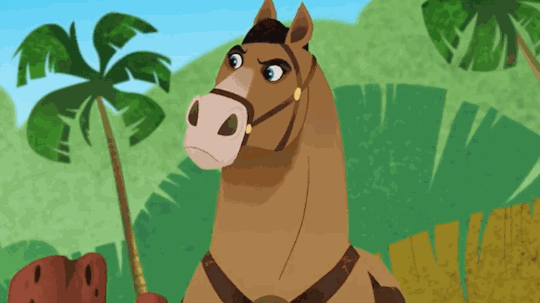
Then there’s this gem from Chris.
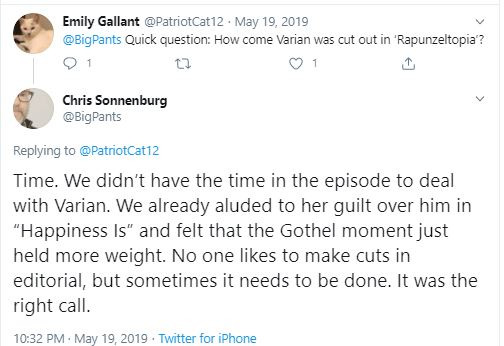
Ok ignoring the fact that you so totally could have featured both Gothel and Varian, seeing as they serve two different functions in the story and mean different things to Rapunzel.... What guilt?!!!
Rapunzel doesn’t ever act guilty over anything involving her treatment of Varian.
That’s when you realize Chris isn’t talking about her feeling guilty about Varian’s predicament. He’s saying that Rapunzel feels guilty of leaving her father behind with this ‘dangerous’ criminal. Which is a big fuck you to everyone.
That’s why Frederic is the center focus of Rapunzel’s hallucinations. Why she’s more concerned for his safety over Varian’s trauma. Chris really be out here trying to use the abused 14/15 year old orphan as a scapegoat for the grown ass dictator who ruined countless lives. Because he thinks a grown woman should feel guilty for leaving her abusive father behind and pursuing her life’s dream.
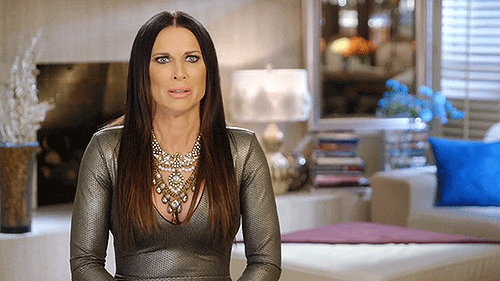
Dude, I try not to assume the worst of people just cause they write fictional characters that I dislike, but Chris really makes things hard not to when he treats his self insert this way.
Oh but we’re not done yet.
When Varian Fans Complain About the Lack of Varian; We’re Complaining About the Lack of a Coherent Plot.
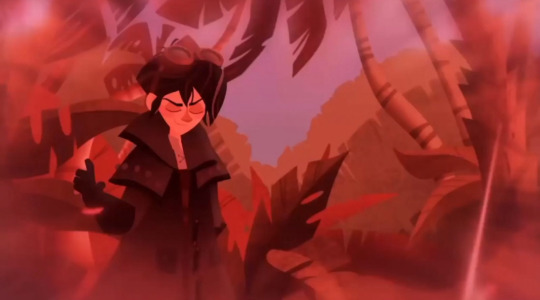
Certain sections of the fandom, bolstered by Chris’s BS, try to act like simply being a Varian fan is grounds for dismissal of any criticism of the show and it’s writing. As if having personal preference for something makes you automatically ‘entitled’ or some such bull. Yet doing so ignores the fundamental complaint that they are making.
We’re not whining about our favorite character not getting enough screen time. No one would have complained about his lack of presence in season two if they had properly resolved his story in season three and had Chris not been a dick to the fans. But it becomes evidently clear as the series goes along that removing Varian left a major hole in the plot. One that makes the entire story and the rest of characters suffer as well.
Think season two is boring?
That’s cause they cut out their main villain at the last minute and failed to replace him with anything.
Upset that Hookfoot was brought along for zero reason?
He’s the replacement character for Varian who no doubt was going to appear in season two originally.
Wish there was more on the Brotherhood and the Dark Kingdom?
Their story impact was greatly reduced when Varian was written out.
Are you a Eugene fan and mad about how the Dark Prince plot went nowhere?
That’s cause the original Brotherhood/Dark Kingdom plot was dropped when Varian was.
Dislike how Cassandra’s character was ruined with her villain arc?
She was originally meant to be possessed but was changed last minute to be a Varian rip-off in the hopes that she would gain some of his popularity.
Wish Zhan Tiri, Demantius, and the Disciples actually went somewhere and that ZT had coherent plan?
That plot were changed last minute to make Zhan Tiri a scapegoat for Cassandra now that her story was changed to replace Varian.
And of course let’s not ignore the character who suffers the most from lack of Varian.... Rapunzel.
Chris’s defense for leaving Varian out of S2 is that it’s “Rapunzel’s Story” and that Varian was only ever a plot device meant to push her along on her quest.
Which means that Rapunzel no longer has anyone pushing her along on her quest!!!
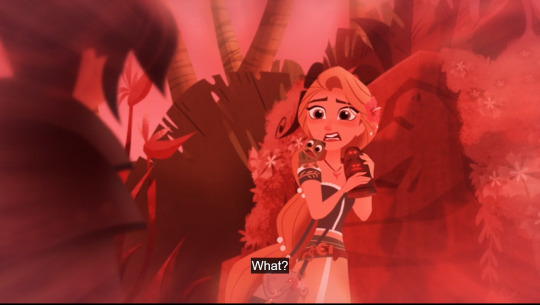
All characters are plot devices. If they aren’t there to serve a story function then they need to be cut. Even Rapunzel herself serves a plot function. She’s meant to be the protagonist of a coming of age story. Which means she needs both an external conflict to face and an emotional arc where she grows as a person. Varian is the plot device that serves both of those functions but he’s now been removed and is no longer allowed to serve his original purpose.
Chris reached into the machine while it was running and pulled out one of the main gears and acted like he always meant to do that. He legit sat there and pretended that everything was running smoothly even as smoke poured out and warring alarms blared. He then tried to shove bubble gum in its place hoping no one would notice as everything fell apart around him.
Cause he’s the thing; no idea is without merit. It’s all about presentation. Removing Varian from season three still could have worked, but it required A.) replacing him with another foe and B.) making sure his arc still got a proper conclusion.
I’ll talk more about Varian’s half-arsed redemption when we get to it; but for now let's focus on the more immediate problem. No one thought to give season two an actual overarching conflict in light of Varian’s absence.
That’s a fundamental oversight that pretty much signals that season two was re-written at the last minute. You have an overarching plot in an action adventure show but no main adversary? I refuse to believe that everyone involved was too stupid to do that on purpose; but if they were rushed and lacked a crew because they walked out due to last minute story changes....yeah that’d I buy.
Because there’s more than enough options to go around; Lady Caine, The Baron and Styalan, Hector and/or Adria, Zhan Tiri’s Disciples ect. were all options. So was keeping the rocks a threat, or have Cass start her villian arc earlier; with proper motivation this time. They could have even come up with someone entirely new.
You had over four years to plan this shit out; why is it not more well put together?!
How Come Rapunzel Can Easily Admit Fault to Pascal But Not Anyone Else?
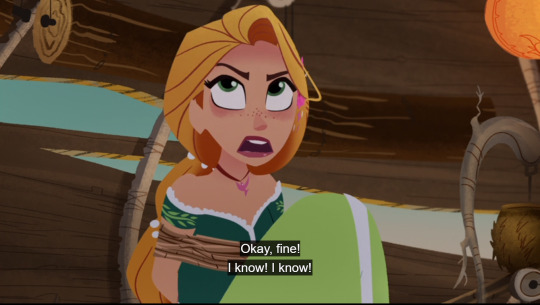
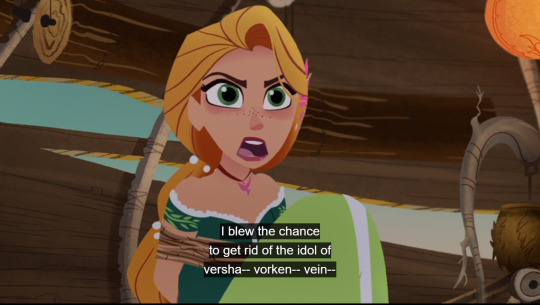
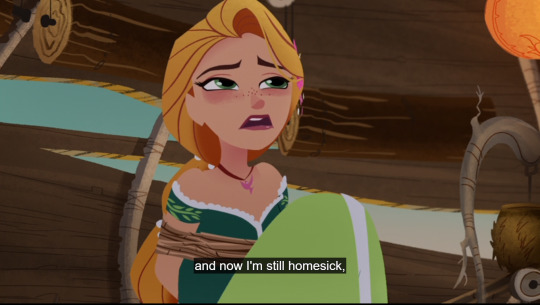
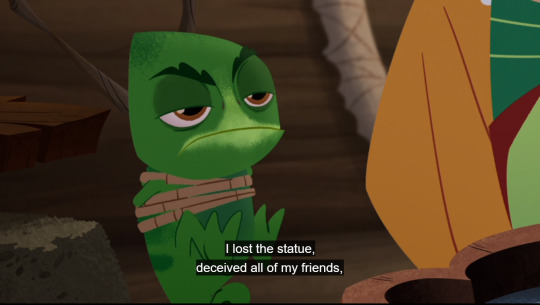
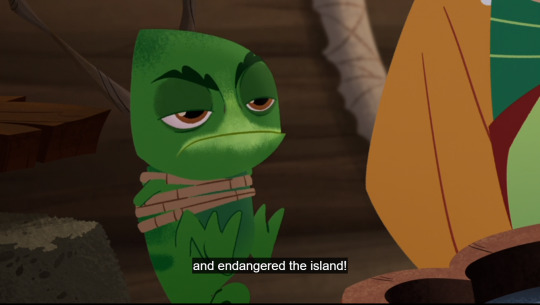
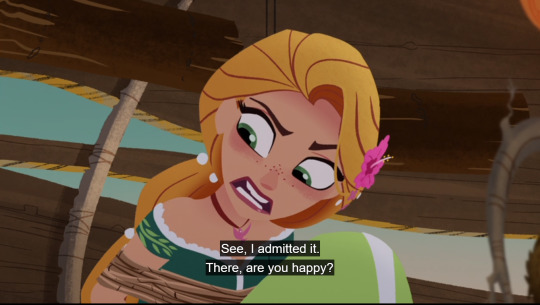
Pascal should have sat perched on Varian’s and Eugene’s shoulders giving Rapunzel ‘I’m done with this’ looks all throughout season three. It’s apparently the only thing that she responds to.
Why is the untalkative camelanion the only one allowed to call out the main character’s BS without going villain?
Conclusion
That’s all there really is to talk about in this story. The actual episode itself is good. It’s the behind the scenes crap that bubbles underneath its surface that needed to be discussed. That way when going forward with the marathon you’ll better see what I’m talking about when I explain how future episode suffered from the lack of planning and foresight.
#Varian#tangled#anti-tangled#anti-rapunzel#cassandra#tangled the series#rapunzel's tangled adventure#tts#rta#king frederic
185 notes
·
View notes
Text
youtube
Watch the American Climate Leadership Awards 2024 now: https://youtu.be/bWiW4Rp8vF0?feature=shared
The American Climate Leadership Awards 2024 broadcast recording is now available on ecoAmerica's YouTube channel for viewers to be inspired by active climate leaders. Watch to find out which finalist received the $50,000 grand prize! Hosted by Vanessa Hauc and featuring Bill McKibben and Katharine Hayhoe!
#ACLA24#ACLA24Leaders#youtube#youtube video#climate leaders#climate solutions#climate action#climate and environment#climate#climate change#climate and health#climate blog#climate justice#climate news#weather and climate#environmental news#environment#environmental awareness#environment and health#environmental#environmental issues#environmental justice#environment protection#environmental health#Youtube
6K notes
·
View notes
Text
II. nightmares
warning: much angst
There are loud noises coming from all around, deafening not only him but also the people who are stupid enough to stick around. They make him paralyzed, make him scared out of his mind and unable to think.
It’s happening all over again. The screams, the insults, the profanities. The “I have raised a failure”s and “we should have aborted you”s. And Gavin believes it too. Every single word being spat out of the grizzly maw resonates deep within his soul, making him wonder why he should wake up every morning if he’s nothing but a waste of space. He doesn’t even want to fight it, because he’s small and tired, and tried so many times before with nothing but more scars to show for it. So he just lets the scene unravel in front of him just like any other time. And the eyes keep watching him, judging him for all he has and hasn’t done. Every member of his family has gathered around to take a part in the shaming ritual that comes about almost every other night. Even his mother is there, piercing him with her blank stare, unaffected by the horrors that take place around her.
Maybe he’s just weak. Maybe he deserves it. Maybe he should just end it all.
He concentrates really hard, wills himself to get away from this nightmare, unsure whether this is just another scenario his fucked up mind has gifted him with or whether this time it’s real. He’s usually hazy about this, ready to perceive the things he sees as a reality and rarely question them further. But among the crowd of callous lights, there is a pair of eyes so unlike any other, so soft and without a speck of malice in them, and he doesn’t know what to do with their sudden appearance. Because he recognizes their owner. The person who has no place in this vile corner of his mind. A place too dangerous for such a delicate being. It isn’t right.
He’d like to think that he’s there to help, that he came to soothe Gavin’s bruised heart. Because he desperately wants him to. Maybe if he just pried his heavy eyelids open…
“You’ve got a new text message,” the automated voice politely informs him. Suddenly his heedless attitude of not caring enough to change the default alert noise starts really getting on his tangled nerves. How many times will he be forced to listen to the prissy lady’s mechanical announcements before he throws his phone out of the window he couldn’t wage, but judging by his nonexistent mental stability, he would say a week – give or take.
He fumbles for his phone, looking for something tangible to take him back into the reality of the present moment but he can’t see anything since there are droplets of sweat around his eyes, blurring his vision. Or maybe those are tears. He can’t really be sure.
His brain is trying to force itself through the skull and out in the open, or that’s how it feels like to him. His fragile heart is stuck in his throat, still beating hard, just like his father used to. Hands shaking, limbs aching. He’s probably running a mild fever, too. It’s nothing he’s isn’t used to. Having night terrors, even at his age, no matter how pathetic it makes him look, it’s still an inherent part of who he is. That’s why he never allowed anyone to get too close, never let anyone see this bonus feature of his.
Gavin never figured he would have issues with keeping this show of weakness to himself. Never thought that there could be a solution to it. Because no amount of therapy and alcohol ever managed to make him free of the ghosts from his past. He knows that there is no magical remedy to this sickness of his, but still, he can’t help but feel like he needs something more. Like there is something missing in his futile quest for survival. Someone who would make him forget who he is for just a second. Someone who would be willing to lie to him about how it’s going to be fine, how he’s not alone in this mess.
It hurts more than the repeating dream would ever be able to. It hurts because he knows it’s a pile of bullshit.
Because he doesn’t want anyone except the one person he can’t stop thinking about. Because Connor would know just the right thing to say to make him feel better, because every time he’s with him, all of his problems get draped in a thick veil. But most of all, it’s because he loves him. He’s never fallen so hard, and frankly, it terrifies him to death. The feeling sits deep at the bottom of his heart, waiting for some divine sign to come up and show its head. It festers there, plaguing his entire body with an ache he has no outlet for. Feeding on the rest of the good things he has left in his miserable life.
If only the person he yearns for wasn’t an immaculately designed android, a one of his kind creation, a precious human being. If only it wasn’t Connor. But then again, he wouldn’t have this problem then, would he.
It’s just that he couldn’t bear such a beautiful being tainted by a wreck like him.
For he doesn't care about Connor's flaws and imperfections. The image of him he has created inside his heart isn’t malleable by the mistakes he’s made or the irritating traits he’s been programmed with. Because no matter how low Connor sinks, there will always be below. And that’s where Gavin’s soul dwells.
That’s why he keeps his feelings for himself. If Connor never finds out, he’ll be spared the inevitable pain that comes after. Maybe the android will find someone who would love him right somewhere on his path. And if he’s lucky, the ache will eventually dissolve into his bloodstream just like it did in the past.
The heart-rending things he wishes for.
After some more psychological self-harm, he finally finds his phone lying screen down on the ground. He picks it up with a groan, his muscles protesting against all and every movement.
There is a new crack that wasn’t there yesterday. A crooked line all across the screen, splitting the display into two halves.
He pays it no mind. Gavin himself is full of scars so what is one more to add to his ever-growing collection. The second thing he notices right away is that the message he’s received is from none other than Connor himself. He tries to convince himself not to open it, has all the persuading arguments ready, but his fingers are quicker than his mind and so he’s left staring at an explosion of red and white hues, an image mirroring the scenery peeking at him through the small part of the window that isn’t covered by blinds. A beautiful picture marred by an unsightly wound.
‘Good morning, detective.’
The universe must truly hate him.
He holds the phone close to his chest, the only way to keep himself from completely falling apart. It’s like he’s grasping onto the very essence of who Connor is. An echo of his soul. The most he’s ever going to take from him.
He swears he won’t cry. And he doesn’t, for a while, until he does.
@a-convin-new-year sorry for any mitskakes
#aconvinnewyear#convin#sorry about the angst but that's all I know xD#that and soft happy endings#something like emotional hurt/comfort#yes the stuff I live for :D#also did someone say daddy issues#sorry gavin but if I have to suffer so do you :D
14 notes
·
View notes
Text
Triangle and bullshit
Taking part in every dramas inherent to this fandom is not in my habits, I must admit it. Generally, I don't agree with the majority view. Why? I don't really know... I already asked myself the question without really finding any answer that totally suits me. Do I have different logics because I'm older than the average age of the fandom? Perhaps my opinions, steeped in French culture, do not match the cultural majority of the fandom? I really don't know. The fact remains that I often disagree with the majority opinion and that more often than not, I force to shut myself up. Unwilling to give anything to chew to people who spend their time complaining, questioning everything, most of the time, I keep what I think for myselfn just sharing my views with fandom friends who, without necessarily sharing my opinions, can themselves be open-minded and less radical than some in the tag.
Anyway, seeing the increasing criticism and, above all, the more or less hateful messages directly addressed to the Skam France team, I feel the need to explain myself. Completely selfish approach, it has no other goal than to bring out what I have in mind, nothing else. Afterwards, I will no longer take part in this sterile and somewhat childish "debate".
The vox populi (aka the majority opinion of the fandom) seems to reject the idea of a love triangle. Small parenthesis... This rejection is so massive, so extreme, that it's impossible for me to forget the underlying narrow-minded morality that seems to create it. I don't judge you ! Myself, at the start of the season, I was one of those who prayed not to be entitled to yet another love triangle. What I regret is the little thought shown by the fandom now that the event they feared has happened.
The love triangle... Let's talk about it.
Love triangle is a dramatic scheme widely used since time immemorial. The literature (western or otherwise) of the past three millennias testifies without controversy to this dimension of archetypal universality of the love triangle. I won't cite all the books, films and series that deal with love triangles, it would be endless. Why does this dramatic pattern come up all the time? But because these triangles can give rise, among the protagonists, to a palette of feelings, each more interesting than the other. Jealousy, humiliation, betrayal, guilt, feeling like a traitor, being dishonest, hurting someone... And guess what? All this... This is love too! To believe in a love without cloud, without wound, without misunderstandings, excuse me, but I find that a little... Naive. Youy think I'm cynical? No no, I sincerely believe in pure and eternal love. I don't turn a blind eye to the difficulties experienced by couples to achieve this, quite simply.
In short..
As unpleasant and painful as it is, the experience of the triangle can be a powerful growth lever for the characters involved. Betrayal has enormous potential value on us. It denounces an identity flaw and at the same time authorizes a process of quest for identity, which will succeed or not, depending on what the characters decide to do with it.
If a triangle comes into our life, on our own or someone else's act, it has a purpose. It becomes the revealing mirror of our unconscious.
You don't like relationships based on triangles? That's too bad, The majority of interactions between humans is based on triangular issues. (One of the three people may very well be imaginary, a fantasy. The triangle may very well not be romantic but can take place into family (Freud and his Oedipus)).
The problem in this fandom is the poverty of meaning that the fans seem to add to the love triangle of this season 5. Exemple: “Arthur cheats the nice Alexia with the bad Noée, it's not good, it does nothing for the story”. Or even without a personal value judgment... “Arthur hesitates between Alexia and Noée, it's silly.” WTF? But if we stick to this vision of things, necessarily that no intrigue is worth exploring.
Through this intrigue, instead of grumbling and rejecting it, how about considering its potential? OKAY! Ok I know! You did't want to see a love triangle. Neither did I. But once we have said that, once we have expressed our dissatisfaction, we should perhaps think of moving on to something else, right? I only see posts that ramble, that always say the same thing, it's kinda annoying, really...
We have no choice, we aren't decision makers. The writers decided to write the story this way. Well. We can have reservations, but that won't change anything, so go ahead, right? Or else, you know what? You can also make the choice to stop watching Skam France or even to shut up... Yes, yes, I assure you, it's possible!
I say all this while finally, for me, in this season 5, there is no love triangle. Let me explain...
For me, there is a love triangle only if there is real hesitation, if one of the three protagonists is really attracted to the other two, may not be in the same way but in any case with the same power. Is this the case here? No!
Arthur is not in love with Noée! Arthur is clearly in love with Alexia, it shows, it feels. Maybe I'm wrong but for me, there is no doubt. For a love triangle to work, the outcome must be uncertain. There, we know very well that Arthur never thought of becoming a couple with Noée.
So no, for me, there is NO love triangle, Arthur is not attracted (lovingly speaking) by Noée.
Okay... Okay, but he kissed her, right?! Yeah right...
But there is kiss and kiss, right? I know many will disagree with me. I know it and I expose myself, by giving my opinion, to many outraged reactions but I want to say it anyway ... (My blog is not important enough to receive haters anyway :P)
I don't think Arthur really cheated on Alexia.
Is kissing cheating? Everyone discuss about it, often sticking firmly to their positions. The debate rages between those for whom the kiss wreaks havoc in the couple with a strong taste of cheating, and those for whom kissing remains harmless and is not adulterous.
the notion of cheating remains at the discretion of each. In my opinion, a kiss can be considered as cheating if it's leaded by attraction, by desire. In the case of Arthur and Noée, it wasn't really the case I think. Maybe yes on Noée's side but certainly not on Arthur's side! And it's Arthur who "cheats", not Noée.
This kiss came to fill a moment of interstellar emptiness. We all know these voids. These moments, often silent, which follow great confidences, when people find themselves in a state of great vulnerability, an intense fragility, where we could die of embarassment or fear. So yes, at that time, Arthur and Noée kissed. It wasn't desire but simple reassurance. Let's face it, kissing someone, touching one another lips, it's a feeling that can make you forget everything. An intimate gesture that comforts, that warms. Did you know? In some cultures, friends may very well kiss on the mouth without this being considered a loving gesture.
So ok, that was bullshit. Instead of kissing Noée, Arthur would have done better to burst into tears, to give her a hug or even to make a mental breakdown, that would have meant the same thing (at least for me) but would have been much more politically correct.It would have less shocked very young fans who still believe in the love of fairy tales...
But... Ok, I take a step aside, I take a step back (come, try, do like me, you'll see, it's pretty easy actually!). For this paragraph, I will consider this kiss as cheating... An infidelity can speak of many other things than disaffection. It can be linked to a problem in the couple: loss of communication, concern for the other, desire, estrangement from the two partners, conflicts ... It can also respond to a very personal problem.
Kissing Noée, Arthur didn't mean to say: "Noée je t'aime", or "I don't love Alexia anymore." or even "That's it, I hesitate between two girls now!". No! Perhaps this "cheating" simply meant "I'm lost", "There is a problem between Alexia and me, we no longer understand each other. ", " I'm scared.". By kissing Noée, Arthur expresses his doubts to the spectator, he lets go under the pressure of being perfect on both sides. He shows himself to be human. And yes! Before being the perfect boyfriend, Arthur is a human.
Anyway!
Love is worth living, it is a feeling of intense lightness, of absolute happiness. But one cannot ignore all the pains which can gravitate around this love. It's not magic.
All that to say that I will continue to follow Skam France season 5 with great happiness. Ok, they did not go in the direction I wanted but... This is also why I watch series, films, that I read books. To be surprised. If I want to control all the stories, I write them, it's that simple. I do not agree with everything that the writers put in place (the treatment of Alexia's caracter disappoints me a lot so far for example) but I won't flood the social networks with my own disappointment and my hateful comments. Trust me, I have a lot better to do with my free time.
So, in short: Take a deep breath, try to step aside, get out of your own representations and you'll see, the Skam France experience is worth living.

#Skam France#Now I shut myself again#I said everything I needed#Don't make me talk about Alexia please#Relaxxxx guys !#Oh and I swear... I never cheated on anyone ^^#I know I can sound bitchy sometimes
18 notes
·
View notes
Note
I just read poisonously pretty and it was the cutest thing and of course Caroline would incapacitate anyone who could stop her on her quest and then threaten klaus with the consequences lol all for the sake of fighting a dragon. Is there any chance for a part 2?
Writer’s Month Day Four - Trope Prompt: Road Trip. A follow up to Poisonously Pretty in which Caroline is a rebellious princess and Klaus is her conflicted guard and there’s a quest.
Poisonously Pretty - Two
“What are you wearing?”
Carolinetosses a scornful look over her shoulder and returns to securing hersaddlebags. She does not offer a response to Klaus’ asinine question. He hadeyes, and a lifetime of putting on his own breeches, surely he could deduce thename of the garment Rebekah had sewn for her in preparation for her journey.
She’d hadKlaus’ horse brought from the stables because, as soon as she’d learned he’d beguarding her door she’d known her chances of giving him the slip were nil.Caroline had adjusted her plan accordingly. When he makes no further movement,no attempt to begin checking his saddle or loading his own belongings, shepauses and turns to him.
He’sstaring at her, expectantly, with a fair measure of disbelief. It makes herwant to fidget, or adjust her loose fitting tunic. Caroline refuses to giveinto the urge. “I can hardly travel incognito in my gowns, can I?”
“You have adozen split skirts meant for riding.”
Again, he’spointing out the obvious and, with her plan coming together so nicely, Carolinehas little patience for it.
“Ten,actually. All in fine fabrics, embroidered in expensive thread and intricatepatterns. Do you want us to be setupon by highwaymen?”
“You can’tmean to pass for a man.” His tone rankles, the incredulousness he’s displayingmaking Caroline think that he’s convinced that she’s an imbecile. It hurts abit. They might not be friends, as they were as children, but she’d thoughtKlaus at least respected her.
She givesthe bag a final tug, ensuring it won’t be jostled loose. She lifts her chin,crosses her arms as she turns to face Klaus. “A man, no. Bonnie offered apotion that would grow whiskers on my face but I declined. I see no reason why,from a distance, it would not be assumed I’m a youth of fourteen or so if Idress the part.”
Klaus isn’tconvinced, his eyes dipping towards her chest. If it were any other man she’dbe offended but Klaus’ gaze isn’t lecherous and, if Caroline’s being entirelyhonest – something she always tries to be with herself – she’s been wishingKlaus would recognize that she’s a woman now. That he’d perhaps find herdesirable. Touchable.
“They’rebound,” she informs him briskly.
He appearshorrified, “I beg your pardon?”
Carolinethrows up her hands in frustration, “Oh please, don’t act like you’re ablushing maid. I’m speaking of my breasts, Klaus. I’ve overheard both Genevieveand Aurora whispering rather flattering things about your prowess as a lover soI assume you’re familiar with the weight and shape of the average pair.”
His mouthopens. Closes. Caroline’s never seen him so discomfited, without a ready quip,and it’s immensely satisfying. “Perhaps you shouldn’t pick your bed partnersfrom among my ladies in waiting if you’re so concerned with discretion.”
Caroline’salways chosen the most gossipy courtiers for her inner circle. It’s onlyprudent, keeps her well appraised of the goings on in her kingdom. Her father’sadvisors aren’t keen on Caroline’s interest in politics. They tend to hide informationthey think her too delicate to know. Caroline’s ensured she has other sources.
“Besides,between the tunic and the cloak I’ll wear, my breasts will be entirelyunnoticeable.”
She’dchecked of course. Had modeled her new clothing for her closest friends andgotten their assurances. Well, Bonnie andElena had assured, Katerina had teased Caroline about how the tightlyfitted leather of her breeches clung to areas of her body that were usuallywell covered. Kat had pronounced the pants alluring, had commissioned Rebekahto make her a pair of her own.
Unfortunately,Klaus doesn’t seem allured. He’s irritated, even further away from her than heusually is, regarding her like he’s not sure she’s in her right mind.
She’d liketo tell him that she’s more herself than she has been in years. Free andexcited about her quest and in control of her own life. She feels exactly howshe’s longed to.
It doesn’t look as though Klaus is going torecover himself anytime soon so Caroline sighs, fits her foot into her stirrup.That jolts him into awareness and he takes several jerky steps, instinctively reachingfor her waist to assist her.
Caroline’sfaster, has ridden astride her whole life – slightly scandalous but her motherhad always refused to be tucked away in a carriage or trail behind the men at asedate pace and Caroline has happily followed her lead - and she’s sitting comfortably in the saddleby the time Klaus is close enough to reach her.
“Besthurry,” she tells him sweetly, tipping her head in the direction of his horse.
He guessesher intent immediately, “Princess,” he says, voice low and thick with a censure.
OneCaroline doesn’t heed, digging in the heels of her boots so her horse takesoff. She laughs when she hers Klaus curse, the sound ringing through the emptystable yard.
Who knewquests could be such fun?
* * * * *
If anyonehad told Caroline that silence was a form of torture, she never would havebelieved them. She and Klaus had departed The Salvatore castle a few hoursbefore dawn and he hadn’t spoken a word to her since he’d thundered up the roadbehind her. It’s now passed midday and he’s only glowered. Her early attemptsat conversation had been answered with nothing but the barest grunts. Carolinehad been forced to give up. She’s tempted to sing but that would give her awayshould another traveler happen to hear.
She’s alsostarving, her back and thighs beginning to ache because if Klaus refused to converseshe’d decided to refuse to suggest a rest or a meal. It’s childish, she knowsbut if he’s intent on making her suffer in silence she’ll ensure he’s asuncomfortable as she can make him.
She sneaksa peek at him, finds him just as stone faced as he’d been the last time she’dchecked on him. Caroline huffs out an annoyed breath, only realizing hermistake when Klaus’ head turns towards her. “Tired, Princess?” he drawls.
“Caroline,”she corrects. Klaus opens his mouth, surely to refuse, but Caroline talks overhim. “What if someone should hear you addressing me so formally? Why, the newsthat I was travelling these lands with such meagre guard would spread likewildfire and we’d be forced to fend of bandits left and right.”
“Meagreguard?” Klaus repeats, highly offended.
She turnsaway, reaching for her flask of water to hide her smile. Perhaps she’s juststumbled onto a solution for her problem. She doesn’t necessarily want Klaus tobe angry with her but if she pokes at his temper, his healthy ego, he’sunlikely to be able to maintain his silence.
A burningdesire to be right, a willingness to fight to prove it, had been the source ofmany of their childhood clashes.
She shrugs,“I rarely see you in the practice yards anymore. It stands to reason that you’reno longer as skilled as you once were.”
“Justbecause you don’t see me, doesn’t mean I’m not there.”
Caroline groans,her head rolling back on her shoulders until she’s staring at the sky, “Mustyou only speak in meaningless nonsense?”
She can seehim in her peripheral vision, just barely, and he’s smirking, the lout. “You’re there every morning. Making aspectacle with Katerina. Surely your skill with your blades can save us shouldwe be ambushed?”
He’sobviously mocking her but Caroline’s stuck on his first words. They hadn’t beena question. “How do you know I practice every morning?”
“I am thecaptain of your personal guard.”
“Oh yes,how could I forget? So nice to know that I only matter because I am your job.” She winces at the nakedbitterness, the hurt that had spilled out with her snide words, urging herhorse to trot a little faster so he won’t be able to see the sheen of tearsthat has clouded her vision.
He allowsher the distance, a modicum of privacy. Somehow, that hurts even more.
* * * * *
They find avillage, a few hours after sunset. Klaus looks around, studying the buildings,the few people who remain outside. Caroline does the same, knows theassessments that he’s making. The street is swept, dotted with buildings ingood repair. The villagers are clean and seemingly pleasant, no drunkards orbeggars in sight.
Klaus mustfind the place pleasing enough, calls to a passerby, asking if there’s an inn.The man approaches and Caroline tips her head down, hoping the dimness and theshadow of her hat will hide her features. Luckily, he pays her no notice,converses briefly with Klaus.
There’s noinn, Klaus is informed and Caroline despairs for a moment. She’d been hopingfor a blanket, a bed, even one less plush than the feather stuffed mattressesshe’s accustomed too. There is a farmer, with a wife and several young sons, who’llprovide travelers a safe campsite, a hot dinner and a place to wash, for asmall price just a short ways down a lane.
Caroline’sstomach rumbles at the mention of hot food. She’d stocked her saddlebags withdry fruit and jerky, has been grazing all day, a home cooked meal sounds rapturous. Klaus thanks the villager forhis assistance, steers his horse in the indicated direction and Caroline isquick to follow.
“Have youthought of a name to go with your disguise,” Klaus murmurs, once they’re aloneagain.
Carolinecannot believe that she hadn’t. She’s been planning this for ages. “Stefan,”she decides. “After the young prince.”
Klaus isn’tpleased with her answer, “You’d name yourself after a boy so easilymanipulated?”
She laughs,more loudly than she should because the trill of it would easily mark her sex, “Whynot? Had he been shrewder I’d never have managed to steal away. I owe theprince a favor.”
“You mostcertainly do not,” Klaus clips out.
Hisexpression has turned thunderous, his jaw tight and brows drawn. If Carolinewere more familiar with caution she’d seek to soothe.
Instead,she inflames.
She’s got adragon to face. She might as well practice with another ornery beast.
Carolinebrings a fingertip to her chin, tapping as if she muses aloud, “Whatever sortof favor would he like, do you think? Katerina’s not a fan of kisses but I’dlike to investigate the matter myself. I can do at least that without risking ruination.”
Klaus makes a noise, low and sharp andinfuriated.
Carolineignores the warning in the sound. “Perhaps a little more, hmm? I’ve been toldthat there are a number of pleasant things a woman can do with a partnerwithout surrendering her virginity. And Stefan is quite nice to look at.”
Klausthrows her a lethal glare, reaches over to slap her horse sharply on the rumpbefore urging his own into a gallop. Caroline’s mare gives chase and she has tolean down, grip tightly with her knees, in order to avoid being thrown.
Well. Seemsshe’d hit a nerve.
Carolinecouldn’t be more pleased.
39 notes
·
View notes
Note
hey *whispers* hey. hey. i saw your post in the wow tag. i would read THE SHIT out of your interpretation of wow lore. i have homework right now but i think i might just read through your blog a bit. the characters have always been such a high point for me (listen. i know knaak did a lot of shit. but you can pry Krasus from my cold dead hands he was EVERYTHING to middle school me) and i feel so conflicted over what theyve done to the characters - sylvanas, anduin, everyone. would love ur take
You might be a little disappointed, most of my blog isn’t about WoW (it postdates my WotLK raiding/RP guild phase, and I’ve only just recently got back into it with Classic). Lots of opinions on WoW characters below the cut.
I actually don’t hate Krasus as a character. He’s fine, he’s not a Designated Idiot Ball Carrier like some of the others are. In re: the dragons generally, I don’t like the simplistic thing WoW lore does a lot where one faction leader going bonkers turns the whole faction into baddies for no apparent reason, because all political entities are monoliths except when they’re not. I’m also not a huge fan of how crowded the, erm, metahuman bureaucracy on Azeroth has become in the lore–like, the Keepers and the Dragon Aspects serve similar roles, and the lore could have done fine with one or the other, and the dragons were here first (and Ysera and Alexstrasza are BAMFs), and so should get to stay.
Sylvanas is bae, obviously, and Sylvanas as Warchief was a terrific move plotwise. I think it’s a pity they had to kill Vol’jin to do it (because I am also very here for Warchief Vol’jin), but she is obviously the more interesting choice. Speaking of Warchiefs:
Thrall doesn’t have the Green Jesus Marty Stu quite as bad as some people think, but he does kinda have it, and I don’t see them grappling quite with the fact that he done fucked up. Like, not only did he install a Warchief who should have had all smart members of the Horde tugging at their collars nervously when he started his rule, Garrosh turned into a Sha-summoning Old God-corrupted, casual-atrocity-perpetrating maniac, not to mention all the bullshit on Old Draenor I do my best to forget about lest my blood pressure spike. We don’t really get a satisfying mea culpa from Thrall for that, and then his response is to fuck off to fiddle around with the Earthen Ring for a bit, before retiring to a farm in Nagrand. Keep in mind, one of the whole reasons the Horde came together in its current shape in the first place is because of the charismatic, hopeful figure of Thrall. It ran the very real risk of splintering under Garrosh for good (ESPECIALLY after the murder of Cairne, RIP Cairne Bloodhoof, you were too good for this world), and even the most unifying successor (which I think Vol’jin was) didn’t have Thrall’s inclusive, unifying vision. Sylvanas doesn’t, either, and even more, is sort of low-key hated by everybody else, so while I don’t think she’s a maniac like Garrosh who would recklessly divide the Horde, she’s also not, I am forced to admit, necessarily the ideal Warchief from a political standpoint.
Even if he didn’t return to the post of Warchief, Thrall had a moral obligation after the Garrosh debacle to try to help hold the Horde together and heal the divisions his negligence caused. At least to throw his support behind Garrosh’s successors, and not to pretend that Deathwing’s death meant everything was OK forever, job done. And if he wasn’t going to do that (and he has excellent motivations for not wanting to do that!), I think the consequences of that have to be explored. I think some people would blame him, and be justified in doing so. I think somebody like Varok Saurfang, who has had decades of experience with the damage bad leaders could do, would rightly be a little pissed, even as he sought Thrall out for help, that Thrall had let the Horde he built languish under subpar leadership. Thrall has been selfish–and that’s great, because he desperately needed some character flaws more significant than “cares too much” and “believes in people a lot.”
Anduin: better than Varian, still a little bland? Varian was a Professional Idiot Ball Handler, who seemed to do stuff not out of a coherent conception of his character, but just because the plot required a Generic Human King to do it. Plus there was all that stuff with the cloning and the kidnapping that never really made any sense. I like Anduin’s optimism; I like that he feels like a thoughtful, reasonable guy, who’s doing his best in often-impossible circumstances. I feel like they could show him being a little more frustrated sometimes, though, and a little pissed at people like Jaina who obstinately refuse to do the strategically correct thing even if it means setting aside their resentments for a bit. Disclaimer: I play almost exclusively Horde toons, they may address this better in the Alliance quests in WoW.
But oh man, besides the Draenei, I hate most what they did to Jaina. Jaina was that rare jewel, an optimist in a world whose setting demands perpetual chaos. Yes, yes, Theramore and the mana bomb, I’m not suggesting she should be made of stone, but it breaks her character to have her suddenly go from someone trying to forge a lasting peace between the Horde and Alliance in WC3–to the point where she would see her own father dead–to someone who now blames the whole Horde as one no exceptions for what happened at Theramore. Should she struggle with grief and pain and anger? Absolutely. But she should deal with them in more complex ways than “now I am become the mirror image of Daelin.” Nevermind that even if she did that she should at least regret not listening to him back in WC3. (Do they address that in BFA with the introduction of Kul Tiras? Idk, I haven’t played BFA at all yet.) It seems like Jaina’s role now is to be the Person Who Hates The Horde, and honestly, that’s a tired trope. It’s just not interesting, it has no nuance, it has no interesting outcomes. You could maybe get away with it with the generation of leaders from the Second War like Daelin and Genn who knew the Orcs only as the fel-corrupted servants of the Burning Legion, but it’s obvious to anyone with two brain cells to rub together than the current Horde is a very different animal politically and strategically, so even if you hate the Orcs with a burning passion, that is not going to transfer to the Tauren, nevermind onetime allies like the Blood Elves.
Gul’dan: oh my god the time travel plot was so stupid. Did the whole universe get duplicated in the alternate timeline? Since travel between the universes is cheap and easy that means there’s a whole nother Burning Legion with a whole nother Sargeras out there that’s still a huge fricking threat! Not to mention a whole nother Azeroth! Did just Draenor get duplicated? That doesn’t seem to match up with the fact a lot of the Burning Legion characters in WoD seem to be parallel universe versions of Burning Legion villains we already know, but it’s not directly confirmed or disconfirmed. Is it some sort of weird Bronze Dragonflight timey-wimey thing that doesn’t have its own independent reality? Ok, fine, but obviously this alternate Draenor has enough of an independent existence for us to visit it again and see what it’s like decades later, not to mention bring some of the people there back. Gul’dan was a fine, if one-dimensional villain but bringing him back from the dead was dumb, dumb, dumb, in a setting where death often feels meaningless and seems to be reversible at random. And the general incoherence of magic in the setting combined with the perennial incoherence of time travel plots (Gollum voice: *we hates them!*) really just reduced WoD to a quivering mess of plot holes, like febrile fan speculation made manifest.
Tirion Fordring: good example of a purely heroic character done well, which WoW has few of. I think because he actually has challenges to overcome, and he doesn’t feel like an idiot.
Bolvar Fordragon: Literally did not know or care who this guy was until the Wrathgate cinematic, but what they did after that with his character was terrific, 10/10.
Malfurion, Tyrande, Illidan: These characters all bore me to tears. My WotLK main was a druid, and I’m a big fan of the druid lore, so I wanna like Malfurion, I really do, but he’s just so dull. Partly because it doesn’t feel like he has any real limitations on his power, just whatever the plot demands he be able to do or not do at any given moment, partly because he just feels like a stiff-necked scold. Tyrande is even more one-dimensional. Illidan is pure 3edgy5me, and the demon hunters in general feel like they get to be too cool to actually traffic in any of the pathos of what should be their emotional equivalents like the Death Knights and the Forsaken. It’s like, “oh man, my life is so tormented, I have these bitchin’ horns and tattoos, and I’m, like, totally immortal, here, hold my rad sword thingies for a second.” At least with the Death Knights you get the feeling that being a Death Knight is a genuinely miserable experience, so there’s some genuine conflict at the heart of the class: sure, you play as a hero, but not the kind of hero you’d necessarily want to be. Demon hunters are just pissed they don’t get to sit at the cool kids’ lunch table, and Illidan genuinely acts like a giant asshole and then gets self-righteous and whiny when his friends and family are like “Dude! Stop being such an asshole!” There’s room for a prickly character, who’s a dick, but who’s our dick, and maybe that’s what they were going for, but Illidan is just the worst.
Azshara, Lady Vashj: The Naga were a giant fucking mistake. A symptom of the inability to let backstory stay backstory, to have to resurrect and retread the same events over and over again that plagues serials when lesser writers without original ideas get let loose on them. Settings like WoW (like Star Wars, like Star Trek, like Dune) are whole universes. You should be expanding the borders, making them feel bigger, more fine-grained, more alive, not beating the same major characters to death over and over again. The ancient Kaldorei are way more interesting as a lost past and a lesson in hubris than fish-snake-people who live under the sea.
Also, water levels are dumb and I hate them. This applies to coral-and-shellfish themed zones regardless of whether swimming is involved.
Cho’gall: I loved the “insane nihilist death cult” reincarnation of the Twilight’s Hammer Clan in World of Warcraft, and Cho’gall as the many-eyed crazed ogre mage with two heads was great. Would much rather have more Cho’gall than Guldan 2.0.
While I’m on Cataclysm: one thing you don’t often feel in worlds like WoW is the possibility of real defeat, because for extradiegetic reasons, it’s impossible to truly lose in any long-lasting way (or, in quests like Battle for the Undercity in WotLK, they just… don’t let you, which feels dumb as heck). I’ve always been fascinated by the idea of a post-apocalyptic fantasy world, a world where the bad guys won, and all the worst things the good guys feared came to pass. I think this is one reason I loved the original interpretation of the Draenei so much, because we saw in Draenor what that really looked like. It was bleak, and it was poignant, and even though it was set within a silly melodrama, it actually moved me. Cataclysm did something similar with the postapocalyptic time-travel instance (time travel being used well for once in WoW!), where you saw that Deathwing’s victory wasn’t just an abstract possibility, but a thing that could actually happen. It made the possibility of defeat feel more real, and it gave you a taste of that same bleak, poignant feeling: this, it said (just for a moment!) is what failure looks like, an Azeroth without life, without hope, in which everything you ever struggled for was utterly in vain. And that motivated you to work even harder to prevent it.
Alleria, Turalyon: “You last saw us in WC2, and since then we’ve been fighting a thousand years (subjective) of endless war against the Burning Legion and been irrevocably changed by the experience” is actually pretty great! But if I were going to rewrite WoW lore, I would make that a thousand objective years and set the final victory over the Burning Legion in the future, at a time when the Alliance and Horde have made a durable peace, and Azeroth has moved on from decades of endless war. I think there’s a real problem with trying to make the player one of the heroes that brings down Sargeras for good because it’s *such* an epic battle, but it’s a massively multiplayer game. Making every player the grand master of their class order was bad enough, but when you are obviously playing out entirely different diegesis from everyone around you, even if you didn’t have problems like sharding and a glut of phasing and cross-server activities and instant teleportation to dungeons, it really feels like a single-player RPG with a chat function. I mean, conflicting diegeses is always going to be a problem with questing-based MMOs, but suspension of disbelief worked when you were plainly one person embedded in a larger effort, like in vanilla, BC, and WotLK. But “you are one of thousands of people who is the Best Warrior Ever and sole Leader of the Warriors, and who has the Only Artifact Weapon that somehow also has thousands of copies”… yeah, that just doesn’t work for me. I feel like I’m being pandered to, and not in a fun way, like with the Pandaren.
Sargeras: I like that they retconned Sargeras to have a better motivation than “demons made me nihilistic.” The idea of a void-corrupted titan being something so terrible a member of the Pantheon would shatter worlds to prevent it is interesting. But the Void gods still feel… kinda non-threatening? We don’t see them actively working to threaten anything we really care about, the Void is mostly a pretty passive abstract force like the Light, and in general I feel like the setting isn’t really dualistic, but er… trialistic? Is that a word? In that there’s a three-way opposition between the Void, the Light, and the Nether/Arcane, from the perspective of which each is the opponent of both of the others, but that’s never laid out explicitly anywhere.
#wow#wow lore#world of warcraft#sylvanas#thrall#jaina proudmoore#warlords of draenor was the WORST#and Legion wasn't much better plotwise
19 notes
·
View notes
Text
A Formula, A Phrase Remains (4/7)
Title: A Formula, A Phrase Remains (4/7)
Rating: T
Word count: 3719
Warnings: None
Summary: Endgame spoilers. Wanda Maximoff has known so much grief in her life that it moves with her like a second skin. But she is a survivor. Moving on is what she does. So she tries to put the latest tragedy behind her by putting all her focus into Avenging and forming a new family for herself.
Meanwhile, Princess Shuri is gathering her own team to bring back someone who was lost far too soon.
Available from the beginning here.
A/N: Thanks to everyone who has read, left kudos, and/or commented. I really appreciate it. This chapter has a little bit of fluff because I can’t help myself, and also some angst and a new development in the quest to bring Vision back.
Disclaimer: I’m including some characters in this chapter that I’m not really familiar with beyond a little bit of research; that’s why they’re not in it for very long.
“Wake up, Wanda. It’s time to leave now.”
“Don’t wanna go,” she mumbled into her pillow.
“Neither do I, but we have no choice, unfortunately.” A gentle hand nudged her shoulder. She only burrowed more deeply into the pillow. The hand moved across her back rubbing soothing circles there. “What if I offered you the proper incentive?”
“There’s nothing you can offer me to make me leave this bed.”
A deep chuckle was his only response. She finally rolled over to look at him. Vision looked at her with fond amusement, with just the spark of a challenge in his eyes. “I believe I can think of something.” Vision reached for her and drew her into a kiss. At first his lips just barely skimmed Wanda’s before he deepened the kiss. She started to wrap her arms around him when he phased away from her.
“Vizh!” He grinned down at her from where he was now standing at the edge of the bed. “That was a mean trick. You really can’t convince me to get up now.”
“My apologies.” She rolled her eyes at his unrepentant tone. He regarded her with faux thoughtfulness. “Perhaps I have to take matters into my own hands.” The next thing Wanda knew Vision had scooped her up in his arms. Her arms automatically went around his neck.
“You didn’t take matters into your hands. You took me into your hands.” She tried to maintain a put-upon expression as he carried her into the bathroom, but she couldn’t resist cuddling closer to him.
Vision grinned more widely. “Well, you are what matters most to me, so I believe it works out to the same idea.” He chuckled again, clearly impressed by his joke. She shook her head at him, but pulled him into a kiss.
Wanda stretched out her arm only to run into her bedside lamp. She sighed as she sat up in her narrow twin bed. The others had teased her for her choice when they started setting up the mansion, but they stopped when she quietly admitted that she didn’t want to wake up reaching across a larger bed to find it empty.
She recognized when she wouldn’t be able to fall back to sleep. She walked downstairs into the kitchen and found Bucky also awake. The red light of the clock on the microwave glared at them, announcing that it was 3:38 am. He nodded at her. “Nightmare?”
She shook her head. “No, good dream this time. You?”
“Yeah.” He looked away from her, peering out the window, even though it was too dark to see anything. “The good ones can be worse.”
There was nothing much to say to that. She put the tea kettle on to give her hands any way to keep busy. “Want to talk about it?” She had to at least ask, though Bucky didn’t seem to be in the mood tonight.
He finally looked back at her. “No. You?” Wanda shook her head again. This was how their middle of the night conversations usually went. Neither of them typically cared to discuss their dreams, but as she had found when Vision sat with her after her brother’s death, sometimes it was nice just to have company. Someone who understood insomnia at their core. The very thought sent a pang straight through Wanda’s heart, but Wanda swallowed her tears. She refused to be ruled by her grief forever.
The room gradually lightened around them as they remained in companionable silence until it was time to get ready for their morning run. Wanda was grateful for the opportunity to move, to focus purely on putting one foot in front of the other, to be pushed to her physical limits. Today was sprints, and Carol always set a brutal pace. Wanda leaned into the brief forgetfulness.
There were many groans as the team climbed the stairs to their bedrooms after their session finished. Wanda relished the feeling of the hot water raining down on her sore muscles.
Wanda examined herself in the mirror after wiping the steam from it. She continued running a towel through her newly redyed brown hair. She had kept the red for a while, in memory of Nat and the happy times she had had rendezvousing with Vision. But no hair color could bring back her loved ones, and in the end, it felt right to go dark again. She swept her hair over her shoulder to get a better look at her face.
Dark circles stood out underneath her eyes, and her face was still thinner than was probably ideal. All her determination to move on could not grant her easy sleep or a healthy appetite. Her insomnia was worse than ever. Every moment spent awake in the middle of the night reminded her that the people who usually comforted her were gone. She was always grateful for her new team, but she missed Natasha’s matter-of-fact willingness to destroy her in training to take her mind off things and Steve’s steadfast, comforting presence. She avoided even a thought of Vision as much as possible. There was always Sam, who had said his door was always open, but he had enough troubles co-leading the team with Carol.
Wanda shook her head. There was nothing to be done about her losses, but she could get dressed and make herself a sandwich. When she finally emerged from her room, she found Carol walking toward her. “Good. You’re done. Tony’s lawyers are here. They want to go over the bequests from Tony’s will.”
Wanda took a moment to process the words, blinking at her. She would have assumed Tony Stark’s estate was long settled, but she supposed with the ongoing chaos even Stark’s influence and wealth could not make the system move faster. “I’ll pass. I’m sure he didn’t leave me anything.”
Carol shrugged. “They specifically requested you.”
“Fine.” She followed Carol down to one of the larger sitting rooms on the first floor. The remaining Avengers were seated while several men and women in immaculate suits stood in front of them.
The lawyers described Tony’s final wishes. There was the trust fund set up to help fund the Avengers for the foreseeable future, various gear that Tony had been designing for each member, and a number of small trinkets bestowed on Thor, who had come in specially with the Guardians for the full team training using Stormbreaker, and Rhodes. By the end of the meeting, there was only a small box left on the table in front of the lawyers. The one who had been explaining each gift said, “This is for Wanda Maximoff.”
The lawyer tentatively handed her a box and a key, attempting an ingratiating smile in Wanda’s direction. She only nodded politely at him. The box contained flash drives and a pile of papers with incomprehensible scribblings. One piece of bright red paper stuck out. She read the contents with growing dread and hope.
Maximoff,
I’d bet my new house that you won’t expect anything from my will, in the event I don’t give this to you myself. I know we never got along and never got a chance to mend fences. Maybe we were never going to, but Vision finally convinced me that it was worth trying.
That’s the real reason I’m giving this to you. I’m sorry we never managed to put him back together. First, we were afraid of failure, and then we were selfish, too caught up in our own lives and our own problems. The world’s been a mess. You’ll have a hard time believing how much. It’s nothing more than an excuse, but it’s all I have to say for myself. I was more aware of how human Vision had become than almost anyone else. I should have pushed Bruce harder to try again.
When Morgan was born, I realized how unfair I had been to Vision. At the time, I was still too focused on how he wasn’t JARVIS anymore. I didn’t appreciate all he had become until he started running away with you. By then, it felt too late to form the kind of bond we could have had.
I hope these notes go some way to making up for the past. They’re everything I know about creating JARVIS and Ultron. All the notes I made when we created Vision the first time. I also included some new ideas on how nanotechnology might be helpful in the process of repairing him. If you’re reading this, hopefully that means we won and someone can help you put this into practice. As of this writing, Vision’s body was still in Wakanda. They agreed to hold it in case the princess ever returned. She’s your best chance if I’m gone.
I wish you and Vision the best of luck. There’s another letter addressed to him at the bottom of this box if you’re able to revive him.
Well, I’ve used up my supply of sentimentality for the month. Just remember, if you and loverboy manage to have a little bundle of joy of your own, you’re obligated to name him, or her, after me. Tony or Toni works equally well.
You know who I am.
Tears were streaming down her face by the time she finished. She’d never have imagined that Tony Stark would make her cry with anything other than tears of rage. The others were all politely looking away from her while Carol handed her a tissue. With a few closing remarks, the lawyers left the room, evidently glad to have completed their task.
She just wished that she would have received this months ago, when she still had some hope that Shuri could revive Vision. The princess had told her that they had tried everything. She offered to hold him in the same room indefinitely, in case some new breakthrough came along, but Wanda declined. With everything that made Vision Vision gone and the smartest woman in the world out of ideas, she did not see the point in maintaining the charade.
She’d asked Shuri to give him a proper ceremony and let him rest in peace, and Shuri had promised she would. Still, she could at least show the notes to the princess. Wanda knew she was coming to New York tomorrow.
***
The first training session with the full team provided a welcome change of pace. Wanda loved when everyone came together, offering new tips and training styles that she didn’t often get to utilize. In the background, she saw T’Challa facing Peter Parker in hand-to-hand combat. She made a note to get some pointers later; she always admired his grace and strength. She didn’t have much more time to muse as she fended off Okoye’s staff with her own. The weapon felt clumsy in her hands, but the one rule for days such as these was that the powered needed to rely on more mundane skills, so as not to receive an unfair advantage in the fight to remain standing. The first fall meant you were out for good.
Wanda spun around only to meet Nebula’s batons. The blue woman’s blow hit at just the right angle and speed to push the staff from Wanda’s hands. She was forced to drop into a crouch to avoid Nebula’s next attack. As Wanda fluidly rose to her feet again, thanking Sam’s insistence on incorporating a bit of flexibility work into her training, she did manage to sweep her foot behind Nebula’s legs, dropping her to the ground. Nebula snarled at her, but the expression lacked any real malice.
In the free for all, Wanda quickly moved onto the next target. There was always a healthy reward for the last one standing. Hope had already dispatched Scott, who was good-naturedly cheering others on from the sidelines. Wanda had had to look away when she also tenderly helped him to his feet. Peter Quill, Bucky, Mantis, Peter Parker, Stephen, and T’Challa were out too. At the far side of the gym, Okoye suddenly brought down Valkyrie. Rhodes and Sam were fighting hand to hand. Carol was fighting Thor, their powers difficult to turn off but not using their full strength.
By the time ten more minutes had passed, Thor and Sam were also relegated to the sidelines. It was down to Okoye, Hope, Rhodes, Wanda, and Carol. Okoye and Hope were already facing off, Hope dodging nimbly away from Okoye’s staff, trying to tire her out. Carol was surveying their fight, presumably strategizing on who she would rather challenge. That left Wanda and Rhodes. Wanda approached him slowly. She and Rhodes maintained a cordial working relationship, but they had never been that close even before the break in the Avengers. His connection with Stark too prominent, no matter how unfair that may have been, as she had come to appreciate his much-needed common sense and ever-present sarcasm. Rhodes appeared to experience a similar hesitation.
But this was war. Wanda picked up a fallen staff to match the one in Rhodes’s hands. They gave each other a few experimental parries, testing and backing off. After a few minutes of that, Rhodes landed a solid blow on Wanda’s back, but she didn’t fall. She managed her own hit on his side. Out of the corner of her eye, Wanda saw Carol and Okoye teaming up against Hope. She was soon down. Carol and Okoye immediately turned to face each other.
Rhodes took advantage of Wanda’s distraction with another strike to her legs. Wanda brought her attention back to the moment, but it was too late. Rhodes knocked her down easily, hand-to-hand combat still not her greatest strength. She accepted his hand up with a grateful nod and went to join the others. Several minutes later, Carol sat next to her, leaving only Okoye and Rhodes.
The crowd grew absorbed in watching them fight. They were both fiercely competitive and felt honor-bound to represent Wakanda and the United States Air Force admirably. They danced and dodged around each other, barely making contact. After several long minutes, Okoye finally began to advance on Rhodes in earnest. Her staff was almost moving fast enough to blur before their eyes. She was preparing a final strike when Rhodes backed away just enough to cause her to overbalance.
Okoye was on her feet again before Rhodes could react. “Well done, Colonel.” Okoye’s congratulations were sincere, but she already appeared to be calculating her next attack. “It will not happen again.”
Rhodes nodded at her, one officer to another. “I wouldn’t expect it to, General.”
With a final round of congratulations all around, the sparring broke up and everyone went their separate ways before the next session.
***
Wanda hid behind a couch with Bucky and Sam as Stephen turned off the lights while they waited for Carol. Hope had offered to take her out while they decorated and prepared the food. They all remained very quiet when the front door opened. Hope asked to sit in the lounge. Their footsteps grew closer, and Carol turned on the lights. They all jumped up, shouting “Happy birthday!” and blowing kazoos.
Carol glared at them before grinning wildly. “You got me.” Finally, Maria stepped out from the corner of the room. Carol shrieked and ran toward her. They embraced and kissed each other passionately, heedless of the others in the room.
They only broke apart when Monica came up and tapped Carol on the shoulder. “Hey, Auntie Carol.”
Carol turned, leaving one arm around Maria and pulling Monica in with her free arm. “You’ve been gone too long, Lieutenant Trouble.”
“Someone has to pick up the slack with you being down here.” Monica had taken up Carol’s cosmic responsibilities when she had decided to stay on Earth for a time to help the Avengers regroup. After absorbing the energy of the Snap, she wanted to do her part in following in Carol’s footsteps. She was finally fulfilling her dream of glowing and flying. It was a source of endless teasing between them.
With the reunions out of the way, the party really got going. Everyone loaded up their plates with food and mingled among those they rarely got to see. Someone set up some music, and there was arguing as they fought for which genre to be played, eventually settling on shuffle.
Later in the night, Wanda approached Shuri, Bruce, and Helen, whose heads were bent close together. They looked up at the sound of her footsteps, jumping slightly. “Nice to see you all. How’s your project going?” She knew Shuri, Helen, and Bruce had been working closely together for more than a year, but she never was able to get any details from them.
Shuri looked unaccountably nervous. “There have been some promising new developments, but it is not complete yet.”
“That’s good to hear.” Wanda could not understand why the three scientists were glancing back and forth at each other, but she ignored the vague unease in the back of her mind in favor of doing what she set out to do. “Shuri, may I speak to you in private for a minute.”
Shuri nodded. Wanda led her to a quiet corner, moving past Sam who dancing smoothly in the middle of the room and trying to draw in as many others as he could. Meanwhile, Mantis and Nebula were talking to Bucky in the opposite corner while Valkyrie and Thor were reminiscing amid a drinking contest. Wanda decided to simply go for it. “It’s about Vision.”
“What would you like to discuss about him?”
“Yesterday, Stark’s lawyers gave us the gifts that we received in his will. He gave me all his notes from when he and Bruce created Vision the first time. He said he had some new ideas too.” Wanda’s voice began to fail her. “I know you said there was nothing to be done, but could you give it one more look?”
“Of course, Wanda. I am happy to try again.” There was an odd light in Shuri’s eyes, but Wanda didn’t question it. She could not afford to get her hopes up after all this time.
“Thank you. Come by my room before you leave, and I will have the things for you.”
They rejoined the party. Sam pulled Wanda into a dance. She was not in the mood, but Sam’s enthusiasm was infectious. Wanda soon found herself getting absorbed in the beat, dancing loosely with Sam, Carol, Maria, Bucky, and Peter Quill. There was much laughter to go around.
The party carried on late into the night. Everyone grew looser and more eager as the music shifted among the various tastes within the mansion. It wasn’t until Stephen insisted that everyone needed to get to bed in order to be ready for another full day of training that the giggling masses moved upstairs to their bedrooms.
***
A few days later, Wanda entered the kitchen to find Cassie Lang, who was visiting with Scott and Hope, eating a cookie. “Hello, Cassie.”
Cassie’s face broke into a beaming smile when she saw Wanda. “Hi!” Cassie’s enthusiasm always warmed her, who also enjoyed seeing the girl. Scott had once told her that she was Cassie’s favorite Avenger, and Wanda could never forget that Cassie liked her when the rest of the world didn’t.
“Enjoying your stay here?”
“Oh, yeah. Do you think you could put in a good word for me? I want to train to be an Avenger. I keep telling my dad and mom and Jim that I’m ready, but they won’t listen.” Cassie had discovered that she now had the ability to grow and shrink like Scott after the second Snap. It had occurred just as she was handling some spare Pym particles that Scott had left behind in his wagon of possessions. Scott and the rest of the Avengers had been trying to help Cassie handle her new powers without becoming a member of the team.
Wanda had been on Cassie’s side of this conversation too often when she first joined the team not have sympathy for her position. Cassie was not a child, and it was galling to be treated as one when you weren’t. But she’d also had enough talks with Scott on the other side of the equation and enough experience with growing up too young to believe that she should appreciate her childhood.
“Cassie, I’d be happy to help train you, but you have all the time in the world to be an Avenger. You’re sixteen. You have a few more years to enjoy yourself before you have to worry about saving the world. Besides,” she leaned in confidentially across the counter, “you’d also have to convince Sam and Carol, and they’re not that easy.”
Cassie frowned at her response, but quickly recovered. “Could you teach me how to throw away that tank like you did a few weeks ago?”
Wanda sent the girl a mock glare. “That was supposed to be top secret.” A warlord had gathered an army and a number of stolen weapons and was marching on a much smaller neighbor when the Avengers were called in. She and Carol had each dispatched one of the tanks while the others had focused on negotiating with the leadership. Wanda was proud of their operation resulting in not a single shot being fired. It was the first time Wanda’s full powers had been drawn on since the final battle against Thanos. It had been both exhilarating and terrifying in a way. She was still not fully recovered from the strain. But they had tried to hush the whole thing up as much as possible to prevent further destabilization in the region.
“Sorry,” she said, not sounding particularly apologetic, “I begged my dad to tell me about the latest mission.”
“Well, it was pretty awesome.” Wanda grinned at her, and Cassie giggled. “Just don’t tell all your friends at school.”
“I won’t.” Cassie paused for a minute and looked at her hopefully. “But since I already know will you tell me more?”
Wanda was easily convinced, glad to have someone she could share stories with who didn’t already know everything. “Sure, let’s go to the library. I’ll tell you all about it.” Cassie bounced on her toes and followed Wanda eagerly.
A/N: It seems to me like the energy pulse they mentioned several times in Endgame is a good way to introduce other enhanced individuals, so I used it as the method of both Monica and Cassie gaining their powers.
I am under the impression that Thor can now summon the Bifrost, and that is how he brought the Guardians to Earth quickly and easily.
Also, I imagine the hand to hand sparring could go a number of different ways, particularly if the enhanced were focused on not using their powers, so I just picked one outcome.
Finally, I forgot to mention this earlier, but if any part of the story is ever unclear or confusing, please feel free to ask what is going on, and I will be happy to answer/make edits to the chapter. I have a lot of ideas built up in my head that I may sometimes forget to actually convey on the page.
#avengers: endgame#spoilers#endgame spoilers#fix-it#endgame fix-it#wanda maximoff#scarlet vision#the avengers#fanfiction
31 notes
·
View notes
Text
Clumsy Business
Who ordered MariChat? Short Friends to Lovers MariChat is at your service. Merry Christmas, @ryuusadesu !
Read it on A03
Adrien was pretty sure that this whole business wasn’t his fault at all and, as a matter of a fact, he had a really good reason to believe that Marinette’s clumsiness was the culprit to blame. However, he didn’t really care about the who, what and why, anymore. All that mattered was that he had finally found someone who would love him back just as much as he loved her.
It all started in September of their last school year together, which was about sixteen months ago. Mlle. Bustier had given her class a seemingly ordinary assignment – by the end of their first semester they had to find, learn about, experience, and write a report on a part of Paris they hadn’t known yet or at least something that wasn’t usually associated with the City of Love’s reputation. Adrien had considered many places but when he had spotted one of his classmates researching Parisian catacombs his mind was made up immediately. Firstly, the mysterious underground world sounded much cooler than anything he had considered. Secondly, he had an unfair advantage – the night vision of a cat. And lastly, when else would his Father allow him to go there if not now, under the pretense of a school project?
Said classmate happened to be Marinette Dupain-Cheng and they had agreed to go explore the underground tunnels on November 01 together. Marinette, thought, caught a nasty flu and spent that day buried under a mountain of blankets, missing their tour. As far as he knew, her next visit was planned for November 11th, which she politely declined Adrien’s company for, not wanting to bother him more than necessary. Which was why Chat Noir had been surprised to see her staring forlornly at a closed Catacomb tour door the next day, as he ran by, finishing his morning patrol.
“Why such a long face, Princess?” He landed in front of her with all of the grace of a feline. “Did the world end and I just haven’t noticed it yet?”
“Yours probably didn’t but mine is as good as done,” Marinette was barely holding back tears. “Almost three months of hard work and research- ruined- all down the drain- and all because I’m so scatterbrained and can’t remember dates correctly!”
“What happened?” he asked if only to avoid the suspicions of having already guessed what was going on. They hadn’t talked since school ended on Friday so Adrien had no way of knowing if she’d missed yesterday’s date too but it certainly looked like it.
“My school project on the catacombs,” Marinette sighed. “I mixed up the stupid dates and now all my work is useless because I can’t experience them for myself.”
“Hey, don’t say that,” Chat smiled. “Just come back when they open next time.”
“Next time will happen next year, Chat,” Marinette grumbled. “The catacombs are open to the public only a few days a year and I need this project done by Christmas holidays.”
“Oh.” He had completely forgot about it. “And writing without going in isn’t an option...” Chat murmured the grim conclusion under his breath. Looked like somebody was in a bit of trouble.
“Yes. Unfortunately, visiting the site is one of the major requirements for this project,” Marinette sighed and got ready to leave. “Well, I guess I’d better not waste any more time and get started on a new one. See you around, Chat Noir.”
“Hey!” His mouth spoke before thinking (but, honestly, Marinette's clumsiness was at fault here in the first place for making her mix up the days. Otherwise, he would've never offered what he was about to offer to her or anyone else for that matter).
“If you want I can take you down there.”
Marinette frowned, looking in confusion at his unnaturally nervous grin. He obviously spoke before he really thought about it but it was too late to back away now. Chat Noir was a hero, after all, and helping citizens in need was his calling. Ladybug would certainly have helped Marinette. Why wouldn’t he?
“I went there once,” he continued. “And I can see in the dark so I can take you in if you want. We’ll walk around for you to get a feel and get out.”
“But the doors are closed, Chat.”
“You are forgetting that I’m really good at sneaking around, Princess.” He smirked. “I’m sure I can find a way in. In a structure like this the official entrance isn’t the only way in, you know.”
Marinette visibly hesitated but gave in pretty soon. He guessed that the prospect of saving the project instead of spending all of the next month doing a new one was just too good to pass on. Plus, Chat was also pretty sure the opportunity of spending some one-on-one time with the hero of Paris up close was just as alluring.
While exploring the catacombs underneath Paris the first time, Adrien would have never suspected that they would change his life forever. Yet his second visit started a change that would soon be hard to ignore.
They agreed to meet in a few days and until then Adrien spent his free time doing some additional research to find an entrance that they could sneak in relatively easily and undetected. Thursday evening, a night when Adrien didn't have any additional commitments, Chat Noir, armed with a few possible entry points, escorted Marinette below the ground. His third try worked like a charm.
Under Chat’s watchful eye, they moved slowly through the catacombs, and, with the help of Marinette’s flashlight, were able to enjoy the view. Soon, they covered quite some distance and, of course, Chat got bored and decided to make this visit not only educational but fun, to lighten up the mood a little, help Marinette relax. You know, what knights usually did for their Princesses… So he might have tried to scare her…
He could swear it sounded much better in his head than what happened in reality…
Marinette’s clumsiness surfaced again and she fell down, almost petrified by his jump scare. A twisted ankle was a result and as an apology, or more accurately, a necessity at that moment, Chat had to carry Marinette all the way back to her house, begging for her forgiveness every step of the way.
That night he dreamed of a tiny, delicate girl, holding onto him for comfort and protection, as they walked through the dark tunnels, yet at the same time showering him with sass and clever remarks only his Lady could rival. In a way, it felt really nice. Who would've known that Marinette could be so much fun? She didn't stutter or freeze with Chat as she did with Adrien and that made a world of difference. That helped him notice that there was something else to Marinette Dupain-Cheng that Adrien Agreste was not allowed to see.
The next day, Chat Noir went over to check on her. After all, it was his fault that she got hurt in the first place. That visit had marked another turning point. Marinette’s clumsiness, that time verbal, struck again and all because of his choice of berries! Did you know that Marinette was close friends with Ladybug? No? Well, Chat Noir hadn’t either. Not until he handed her a bowl of raspberries as a get-better gift and said they were his Lady’s favorite. Without a second thought, Marinette had corrected him.
“She prefers strawberries, Chat,” she had giggled. “So much for your claim to know everything about her.”
After that, it only took him a few coaxing questions to figure out the astonishing fact of their friendship. Apparently, balcony rendezvous with treats and warm drinks were a regular thing between Marinette and Ladybug. They also had a lot in common from what Marinette let slip and that gave Chat an idea. Plagg hadn’t been much help in uncovering his Lady’s identity and not like Adrien would violate her trust by going behind her back…
Still, he couldn't help but wonder how much more effective his wooing of Ladybug would be if he were to know more about her? Her likes? Her preferences? The things that made her tick and the ones she despised? More knowledge about his partner’s character could change everything! It could easily put him on the next level in the quest for Ladybug’s heart. And to obtain it Adrien needed to make use of his adorable classmate’s occasional slips of the tongue.
Decision made, Chat Noir started to visit Marinette at the end of November on a weekly basis. At first, it was at least once every six or seven days. Then he would run by more often until eventually it became whenever he could.
Marinette was not pleased. She tolerated him the first few times and even treated him to some sweets. However, as soon as it became obvious that Chat Noir would be a regular intruder, she got annoyed.
“A girl should have a space to call her own and not be afraid of a random cat busting in every now and then,” she would say and push him out the window. “What if I want to walk around naked? You can’t come by whenever you want!”
Despite that, Chat persisted because Adrien couldn’t just walk in and start inquiring about random Ladybug facts. Chat Noir could. Adrien Agreste would never be able to openly spend hours and hours a week in Marinette’s room without some questions he would rather not answer, but Chat Noir could. Chat Noir had all the excuses in the world and was free enough to act upon them. Adrien Agreste didn’t. He just became more careful and considerate, asking Marinette’s permission for a visit in advance and to keep pleading until he got one.
Marinette still wasn’t pleased in the slightest but his changed antics made her softer, allowing him more frequent visits. Eventually, she accepted the fact that the annoying cat would keep coming back no matter how many times she pushed him out the window. So, to compensate for the discomfort, Marinette, being Marinette, decided to be clever and put him to work. As a result, for the next while, Chat Noir cut, drew, glued, wrote, modeled, delivered, helped her study and did so many random chores he couldn’t possibly remember them all.
By the time the spring had started, the “personal slave” stage was over. Thankfully, it lasted only a few weeks at most and ended with Marinette and Chat being the best of the buds. That was when his effort had finally paid off and, as a friend, Marinette started to release little details of his partner’s preferences.
Ladybug liked pink. She liked to draw and design. She was graduating school this year. She loved sweets just as much as her kwami. Gabriel Agreste was her idol and she had a female best friend, which wasn’t Marinette. She dreamed of becoming a designer and knew absolutely zero Chinese.
Ladybug thought the world about Chat Noir but she had a crush on someone else. Sadly, an unrequited crush.
That info was a little upsetting but didn't stop Chat at all because the word "unrequired" was a very hope-inspiring one. It meant that if his Lady would one day decide to look somewhere else for love he would be right there by her side, knowing exactly how to please her and finally having a chance at winning her heart. And for that, he needed to come to Marinette's house more often and learn little by little as much useful information as he could. The company of a good friend and random treats were just a nice bonus. Marinette’s episodes of sporadic clumsiness and tripping where they would end up a sprawling mess on her floor were kind of nice as well. Chat liked the way Marinette blushed and stuttered when that happened but never thought much of it. After all, being so close to a superhero and a model in disguise must have been quite intimidating. One time he even accidentally landed a smooch on her cheek but since Marinette hadn't noticed, Chat decided to spare her the embarrassment. She was crimson enough already. Plus, he needed to come back for more info and for that he had to be in a good standing with her.
Spring flew by fast. Their friendship stepped into a new territory at the start of June when, for her birthday, Chat Noir took Marinette to one of his favorite places in the whole Paris – the top of the Eiffel Tower. Cliché, he knew that, but while he was almost used to the breathtaking views he was pretty sure that Marinette, who had no means of her own to get there, would be impressed and inspired by the beauty. The right inspiration could do wonders for such a talented person as Marinette, so this looked like the perfect present for ESMOD’s newest student. At least Chat really hoped so.
Thankfully, judging by the way Marinette’s eyes shone as she silently took in the view of the night city, it looked like Chat had succeeded. He couldn’t help but smile, seeing how mesmerized Marinette looked, how peaceful and happy, even tranquil she was, holding onto a beam for safety. Wind softly brushed her hair as she gazed into the distance, paying absolutely no attention to her companion. She was glowing, emanating a soft halo reflected from the lights all around them. It complimented her natural beauty incredibly and for some reason he couldn’t take his eyes off her. In that moment Marinette turned around and said something but it was lost on him. His mind was too busy connecting the ethereal, alluring loveliness of his best friend he barely noticed before with her other amazing qualities, including all of her little faults he had come to like so much. Her stubbornness, for example. Simply irresistible.
“Hey, Chat?” Marinette’s voice finally cut through the thick clouds of his thoughts. “Are you feeling okay?”
“Yes, totally fine,” Chat assured, feeling much warmer than a moment before. Must be those unpredictable hot Parisian nights. “Why? What happened?”
“You keep smiling and ignoring my questions. Almost seemed like you weren’t here at all,” she smiled. “Listen, if you are in a hurry, we can go now. I think I got all the inspiration I needed. Plus—” Marinette’s voice obtained a hint of teasing as she started to walk towards him, “—I have something-”
The rest of the sentence was abruptly cut because the stupid clumsiness had nothing better to do than to make Marinette trip at one of the most dangerous places in Paris. Really, what was that? There was nothing to trip on!
“Marinette!” Chat cried and launched ahead, falling to his knees but catching the precious person in his arms just in time. He closed his eyes and let a relief escape his lips, pulling her closer. “You’ve got to be more careful,” he whispered into her hair, refusing to let go until all the confusion and fear would go away, until she would stop trembling.
“I’ll try my best,” Marinette quietly replied and cuddled closer. She looked a bit distraught by almost falling down and in need of some comfort. So he held her tighter and didn’t move. Not until about five minutes later when she sneezed.
"Bless you," he chuckled. Adorable, really. The air was hellishly hot, why would Marinette sneeze? She didn't look cold and he certainly hoped she wasnt getting sick. But just as a precaution Chat wrapped his arms tighter and pulled her flush against him to share some warmth.
“I wanted to say I have something for you at my house,” Marinette murmured into his chest a few moments later.
“Hmmm,” Chat grinned, leaning closer and sniffing. “Do I smell something sweet?” Marinette often spoiled him with her baked goods. Must be either macarons or cookies.
“Possibly,” the girl giggled and pulling back, poked his nose with her finger. “But the only way to find that out what exactly is to take me home.”
“Then what are we waiting for?” he purred and picked her up princess style. Just the way she deserved to be carried. He quickly brought her home and patiently waited while she brought out a box of his favorite macarons. Settled on her balcony, they spent some time chatting about nothing in particular and just as Chat was leaving Marinette leaned in and placed a soft kiss on his cheek.
“Thank you for the present,” she whispered against his flushed skin and pulled away.
“I’m happy you liked it,” Chat replied, stilling instantly at the intimate contact.
"And for the rescue." She kissed his second cheek, rendering him speechless. What he had considered to be a hot evening earlier seemed like nothing but a light breeze comparing to the way it felt now. Seriously? What was wrong with the weather these days?
“No problem,” Chat squeaked and scattered away because something in his chest was also beating way too fast to be normal. He’d better get home and lay down. It would have been quite inconvenient to die on Marinette’s balcony for both his father and her.
After the summer followed September and Marinette began attending ESMOD. Adrien had his own school but visiting her weekly as Chat Noir had become somewhat of a tradition now. She was one of his best friends and coincidentally played an important role on both sides of his persona. As Adrien, he saw her a little less than usual due to the conflicting schedules but Chat Noir had free rein of when he could come and visit his Princess. He might have used that and tried to compensate for Adrien’s absence in her life. Just a tiny bit.
Little by little though, unbeknownst even to him, his intentions for those visits had changed. No longer he had tried to pry into his partner’s life through Marinette and, to be completely honest, he had even caught himself thinking that maybe if Ladybug didn't want him, he should look somewhere else. He could, for example, look at someone who was adorably cute, amazingly awesome and already had a crush on him.
Oh, did you know that Marinette had a huge and embarrassing crush on Adrien ever since they met? He hadn’t either. That is until he saw her screensaver sometime back in his “servitude” months. Of course, he had noticed all of the posters and photos of his civilian self before but they could easily be explained (a close friend and a handsome model wearing her idol’s designs, nothing unusual). The multitude of hearts all around his face on her screen was not.
Marinette didn’t even deny it. Chat blushed under his mask and said nothing but that knowledge found a permanent place in his heart and now suddenly it surfaced and forced him to compare the two.
Marinette loved him. Ladybug didn’t.
It hadn’t bothered him before. When Ladybug gushed about the boy she loved, he listened. When she said there was someone else who was recently catching her eye, he said nothing. Even when in the middle of the summer, Ladybug had mentioned her intentions to pursue the other boy, it was okay. She said she was spending more time with him and was discovering what an awesome guy he was. Chat hoped that, maybe, he was her third choice because clearly, he wasn’t spending much time with Ladybug these days. His evenings were devoted to Marinette, so it couldn’t be him. He didn’t mind being the third at all. He tried to convince himself that as long as he stayed loyally by her side, sooner or later she would notice him.
But then October came and The MisunderstandingTM happened. The knowledge of Marinette’s crush and this practically forced him to admit that maybe yes, being the third choice sucked and yes, Marinette was just as good if not better than Ladybug because for her Adrien was first and if he dared to dream her second choice was also him, just in the black leather and donning a pair of cat ears.
And all it took for him to admit that was an old trusty case of a damsel in distress. Well, at least he thought it was that.
By that time Chat had been visiting Marinette for over a year and it happened so that most often than not he always was at her place on Thursdays. It almost felt like an unspoken tradition between them. Exactly at seven he would come over and Marinette, for all her adorable clumsiness and forgetfulness, would be there. For the whole year he’d been visiting, she’d been late only three times and by no more than five minutes. So, when a few weeks into the new semester Chat waited for almost an hour with no Marinette, he got antsy and went out to scan the streets.
After all, who would know better than him just how clumsy she was? The city was enveloped in darkness already so she could’ve easily hurt herself somewhere! He had to find her and make sure she was okay. He couldn’t just leave and sleep peacefully, knowing that Marinette might be in trouble.
His first destination, of course, was her school. It wasn't that far away and soon he was already scanning the building. There were a lot of windows lit but only one of them had shouts and screams coming out of it. Someone was in a heated argument, a possibly violent one from the sound of it. What’s worse, Chat clearly recognized one of the voices and the second he did, blood boiled in his veins and he rushed to the rescue.
The dimmed lights made the room look smaller. Marinette was at the front arguing with some not very friendly-looking guy. There were a few more people standing in the middle of the room and not a single one of them did anything about the knife the guy was threatening his Princess with. A low growl rumbled through Chat’s throat as he smashed the window open and landed between the assaulter and Marinette.
“I dare you to take a step,” he seethed through his teeth and got ready for a fight. To his amusement, instead of attacking, the guy backed away and frowned in confusion. The rest of the people in the room collectively gasped yet pretty soon a few giggles were also heard. As for Marinette, her exasperated groan Chat could feel with his back. Not a moment later she grabbed his hand and pulled him out in the hallway.
“Chat.” She crossed her arms over her chest as soon as the door was closed. “What are you doing here?”
“What was that?” he frowned instead of answering. “He was attacking you and no one did anything!”
“Because it’s a play, Chat, and the knife is a fake.”
“A play?”
"Yes, a play," Marinette sighed and pitched a bridge of her nose. "Listen, Chat, I haven't told you about this because this isn’t exactly the highlight of my day. I’ll explain later. For now, just know that I didn't really had a choice.”
“How did you manage to hide it for so long though?”
“Because the practices were on Tuesdays and you never visit on Tuesdays,” she explained. “It was quite convenient, actually.”
“Oh yeah,” Chat murmured under his nose. Adrien had Gabriel photoshoots on Tuesdays. That’s why Chat was skipping out. “So what kind of a play is this?”
Marinette narrowed her eyes on him, searching for any signs of mocking but he looked sincerely curious. “I'm a victim who survives an attack,” she replied, “and later catches the serial killer, using her amazing fighter skills."
Chat raised an eyebrow.
“What?” Marinette resented. “I have you to know I’m the best fighter in this club.”
“You trip over nothing.”
“Only when mangy cats cross the road in front of me!”
“Really?” his lips were trembling, threatening to explode in laugh.
“Don’t you dare laugh at me!” Marinette threatened, poking his chest with her finger. “I didn’t have a choice! That’s all you need to know. Better explain what you are doing here?”
“I came looking for you since you were late,” he explained, lightly chuckling at her antics.
“Late for what?”
“What do you mean for what? We always meet on Thursdays so I came and you weren’t there so I thought-”
“You thought I was in trouble if I hadn't shown up one day? Even knowing that we had never agreed to meet every Thursday?”
“Yes?” Chat’s ears dropped flat as the ridiculousness of his conclusion started to dawn on him. “I’m sorry,” he whispered in a short while, his gaze falling to the ground. “I shouldn't have assumed that Thursdays were my days. You probably have some new, more interesting things to do now. Like this drama-”
“Oh, Chat,” Marinette lips quivered in a soft smile. She stepped closer and wrapped her arms around his torso, a gesture that was so familiar yet so dear to him now. “I’m sorry,” she murmured into his chest. “I should’ve told you.”
Chat closed his eyes as he automatically laid his head atop Marinette’s and wrapped his hands around her. For some time now she really had been spoiling his affection-starved self with hugs and he treasured every single minute of it, often finding himself unwilling even to breathe in fear of spoiling the moment. Savor the touch, enjoy the closeness and soak up the affection. Hold back that pleasant rumble in your chest!
He barely succeeded.
“For what’s it worth you played really convincingly.”
"Well, it was really amazing of you to jump in and save me too. Adorable even."
“I am one of the heroes of Paris,” Chat boasted. “That’s kind of my job.”
He could feel Marinette’s smile against his chest right before she pulled back, stood on her tiptoes and kissed his cheek awfully close to the corners of his lips, sending his poor heart into a frenzy again. He did, however, saw the way her own cheeks blushed and noticed that this time she withdrew much slower than the last time. Not that he remembered that first peck by heart. Every single millisecond of it.
“You are my number one hero, Chat Noir,” she said quietly, looking more beautiful than ever. “Thank you for worrying about me.”
“You’re welcome,” he mumbled, frozen in place. “I- I ca- can wait- yeah, wa- wait for you and- well- walk yo- you home, if you want,” he added, his mind in a complete shutdown.
“That would be nice,” Marinette smiled, brushing away a stray hair behind her ear. “Give me another ten to fifteen minutes and I’m all yours.”
In a moment, she disappeared into the room and all that Chat Noir could do was to slowly slide down the wall and be shocked. Shocked because it hit him so suddenly and so unexpectedly. Shocked because something he thought would never happen just did. Or rather he realized it just now.
He was in love with her. He was in love with Marinette Dupain-Cheng. He wanted to be by her side. He wanted to protect her, to marvel at her beauty as long as he could and enjoy every single touch she was willing to give him. He wanted to have fun together and be silly. He wanted to be with her.
And he was weirdly happy about it. A dopey smile stretched his lips as he covered the place she kissed with his palm. In a second he grinned harder because the nice part of this was that Marinette liked him back! He knew she did! He saw her screensaver! But… Could he dare to dream that she liked Chat Noir too? It certainly seemed so, judging by the way things between them were going. Just over a year ago he was an irritation and an inconvenience to her. She hugged and kissed him now and was always happy to see him. Could this really be…?
There was only one way to check this and that was to tell her how he felt. If only that was so easy.
For the next few months, Chat tried to, first, make sure he wasn’t imagining his feelings and, second, find a perfect moment, or at least gather the courage to say the words. As for his first point, there were no mistakes. He was hopelessly in love. Even he couldn’t deny it anymore. Chat still respected Ladybug and thought she was cute but Marinette was the one holding his heart right now. Yet similarly to his Ladybug attempts, he tried and failed to tell her about it a couple of times. Every single one of them ended up rather embarrassingly and at the end, Marinette hadn’t understood a thing. At nineteen, you’d think he was more than capable to do such a simple task. Apparently, not him and not to such an awe-inspiring, jaw-dropping, mind-blowing girl as Marinette.
Today, however, as Chat was visiting her at the end of the Christmas Day, an opportunity came knocking on his door. The day was perfect. It wasn't too cold but it snowed those nice, fluffy snowflakes. They had spent the day with their families but once the night fell on the city, Chat Noir sneaked out of his room and soon was presenting his modest gift in a form of a diamond bracelet to Marinette. In return, she made him the most amazing Christmas ugly sweater. Chat could only imagine how disgusted his Father would be the next morning when he would parade it around the house.
Then the time came for signing of her cast because as it would happen, his dear, clumsy Marinette slipped a few days prior and broke her wrist. Nothing serious, but the cast was put on and signatures were signed. He could see his own, Alya’s, Nino’s, Tom and Sabine’s and a few of her other friends. There were flowers and hearts and someone even drew her a cookie. Chat Noir, however, had something else in mind because, finally, her clumsiness (can you see why he had grown to adore it now?) provided him with an opportunity to say the words he hadn't been able to tell anyone yet. After all, if he couldn’t say it, he could always write it.
“Go, on, kitty,” Marinette asked again. “Sign it.”
“Can you not look while I do it?” he asked.
“Sure,” Marinette was surprised but closed her eyes nevertheless. “Why?”
"I'll write you something special," Chat replied and was about to start when a loud crash and a distant evil laugh echoed through the room. Marinette's eyes flew open. For some reason, she glanced at her cast immediately, looking a little bit more concerned than usual when these things happened.
“Akuma?” she almost whispered.
“Afraid so,” Chat sighed. Another chance seemed to be gone. But then Marinette shifted her worried eyes at him and his mind was made up. He wasn’t sure what was different this time but his Princess shouldn’t be afraid of some random akuma. She should know that he loved her and he would always protect her no matter what. And that meant…
“Close your eyes,” he asked again. “I’ll write it quickly and will go deal with an akuma.”
“Okay,” Marinette nodded and complied. She sensed something scribbled on her cast and heard the sound of writing. She heard barely audible “I’ll come back to talk about it later" and felt a light kiss on her lips. She saw only the tail of an escaping cat-boy when she opened her eyes. Amongst all the signatures the new one made her smile. With eyes full of adoration, Marinette whispered her own confession to the one who was already at the battle field.
“I love you too, Chat.”
Buy Me a Ko-fi
#marichat#ML fic#Secret Santa server exchange#friends to lovers#one shot#short#story#Ryu#Merry Christmas
425 notes
·
View notes
Link
Last year October, about a week after the nation space that we have generously agreed to refer to as Nigeria, celebrated her 59th independence from colonial rule, I found myself at the Athens Democracy Forum, Athens being of course that former nation-state that claims the honour of pioneering a system of governance that we all today celebrate under the name – democracy.
I have no intention of challenging Athens on her claims. What is of note in that claim is simply that the Greeks consider this system of socio-political arrangement of such primal validity, despite numerous challenges and setbacks, that they continue to flaunt it at the rest of the world as the ideal to which all of humanity should aspire.
What is even more striking is that much of the rest of the world continues to fall in line, join in the exercise, and propagate its virtues.
Two weeks after that conference, I was back on this soil of our own continent on an allied interrogation of history generated concepts. The venue of the second encounter was Dar-es-Salaam, the occasion, the bi-annual Conference on African philosophy.
My remarks today derive largely from issues raised by those earlier exchanges. There is a coincidence of timing and relevance for our present gathering here, both thematically and historically, a coincidence that almost qualifies as a gift of Providence, since all three encounters are geared towards the historic search of humanity for existential choices based on the exercise of collective wisdom.
I do not speak of wisdom as an abstract pursuit, a lofty aspiration that exists in a rarefied realm of its own, but wisdom as the very manifestation of the human ability to seize both phenomena and experience by the throat and squeeze them of any lessons they have to offer us in amelioration of human existence.
That claim is justified by the very theme of this encounter: NEVER AGAIN. It is not the first time most of us here have heard that expression. It is, unfortunately, also not the last time such an exhortation will echo in human caucuses, structured and/or casual, organized or improvised.
It is both sentiment and pragmatism, an admission of an error, of an anomaly, of a less than desired expectation of ourselves, what we believe we are capable of, what deficiencies in judgment we consider we are capable of transcending.
It is, to sum up, indication of our capacity for vision, a refusal to be stuck in a mode of thought that discountenances the possibilities of human transformation, of possibilities of transcending present limitations.
That resolve may emerge from individual or collective experience. Let me bring it down to the most mundane, accessible level. Let us say, in a foolhardy moment, we have exceeded the dictates of prudence in spending, overshot one’s budget.
What do we swear when the moment of realization descends? Never Again! Or perhaps – a more literally sobering experience – who still recalls his or her first hangover the morning after a night of over-indulgence? The very first words that emerge in that first flush of sobriety? Again, the two words: Never Again!
The trouble of course is that humanity tends to forget such lessons too soon, and will be found pursuing the same course of action again, all over again and again.
We become inured to what we consider our capacity for recovery, even boast of our increasing resistance to the effects of the night before.
However, we know only too well that, side by side with that seeming capacity for recuperation, there is a steady erosion of the physical constitution that comes from excess. Sooner or later, the liver – among other vital organs – will take its revenge.
That latter analogy is quite deliberate. Power intoxicates and, in that drunken state, human beings become mere statistics. Some people remain in a drunken stupor for years, alas, intoxicated by the sheer redolence of power and cheap access to the instruments of force.
And so I evoke that analogy to bolster those sober and anxious voices that warn, from time to time, that no nation has ever survived two civil wars.
The claim that no nation has ever survived two civil wars may not be historically sustainable but, it belongs to that category of quest that I have referred to as the pursuit of wisdom – in his case, we may equate it with the wisdom of not holding a bank note over a flame just because the Central Bank claims that it is fireproof. Or attempt to hold an exposed electric wire, just because NEPA is notorious for electrical incapacitation.
Correspondingly, our analogy is sternly directed as a mirror to those contrary voices which boast: “I have fought a war and put my life on the line to keep this nation one, and I am ready to do it all over again.”
That bravado, by the way, conveniently overlooks the reality that a parallel, often more devastating toll in human lives and lingering trauma is also exacted from untrained, unprepared non-combatants, burdening the future with a more unpredictable, indeed even irreversible hangover.
And that introduces us conveniently to my second conference in Tanzania for which my contribution was titled: WHEN IS A NATION? – with the sub-title, Power, Volition and History’s Reprimand. I believe you have begun to grasp the connection.
If not, let me remind you that Tanzania was one of the five nations that recognized the breakaway Republic of Biafra during the Nigerian Civil War.
Finding myself in that setting, among products of a very special historical formation – pre- and immediately post-colonial African - despite variations in detail, if was an opportunity to interrogate what, if any, could be considered a philosophical or ideological extract from a human event that consumed – it is estimated – two million and a half lives within two years. One of the preoccupations of philosophy is of course to immerse its processes in what actually makes humanity – tick.
So, there we were in Tanzania, a crucial player in the Nigeria – note, I do not say Biafran but – Nigerian tragedy.
Regarded as a progressive nation, with a track record of support for liberation causes both within the continent and outside – such as the Palestinians struggle for nationhood - serving as a front-line buffer against apartheid South Africa and thus incurring punitive attacks from that racist enclave, Tanzania nonetheless chose to go against the tide of opinion within the then Organization of African Unity.
She recognized a secessionist state at a time when such a position was not only unfashionable, but was even regarded by many as an act of race treachery, a rupture of the not-for-discourse, not-for-consideration political ‘absolute’ named: African Unity.
Yes indeed, that was the conjure word: African Unity. Unity as in non-fragmentation, non-divisible, was a proposition in transcendentalism, an Absolute.
A modern continent, offspring of multiple rapes – or indecipherable trading treaties - and externally imposed distribution lines, was to be weaned on the milk of a foster mother named – African Unity
So let us consider the implications of that collective position.
In objective terms, what exactly was it? A historic irony, I propose. We are introducing here a very plain issue that goes to the heart of national coming-in-being of any people, that issue being a polarity between volition and – dictation.
Perhaps you will now admit the relevance of my commencing reference to that other conference that occupied itself with the ancient socio-political system known as – democracy.
The Yoruba have a proverb for that implicit lesson in contradictions - it goes: won ni, amukun, eru e wo, o ni at’isale ni. Translation: The knock-kneed porter was told: that load on your head is skewed. His reply was – ah no, the problem lies at the base, at the beginning, not, in the consequence.
And so, the question is thrown open as a fundamental proposition: is democracy itself not vitiated, not a sham where the roots of coming-in-being of a people spell dictation, coercion as opposed to – choice? Volition? Consent and Participation? Those are the building blocks of Democracy.
Democracy is manifested in act, not in the rhetorical flourish. That is the irony to which I refer, an irony that commenced when the Organization of African Unity adopted the very protocol of the inviolability of national boundaries – that is, the sacrosanctity of given boundaries, dictated, imposed, arbitrary and artificial boundaries, and its members resolved to defend those boundaries to the last drop of our blood.
Now, a pause here is mandated. Tomorrow, I know that I shall open the pages of the newspapers and read that Wole Soyinka has advocated the breakup of Nigeria. One reporter will deduce that from an underlying principle I have just enunciated, jot it down in his or her notebook, and others will copy that conclusion verbatim.
Too bad for the nation’s Intelligence Quotient – known as I.Q. I have long given up, and will proceed – as I always have – on my own terms, with my uninterrupted dialogue with history, and in my own mode of expression.
Those who wish to catch up can do so in their own time. My extract from that Civil war remains what it always was - a simple self-interrogatory: Have we been had? Absolutes tend to resound with a clarity, an exclusionist proceeding that does not tax the brain.
Absolutes readily corral even millions into a comfort zones of unquestioning receptivity, simply from fear, or even just from the way they sound, not for the implications of their content.
Absolutes however remain what they are – glorified sound-bites such as: The sovereignty of this nation is non-negotiable. Yes, what exactly does that mean? We know what it meant for the first-comers at the helm of affairs in the Organization of African Unity.
It meant: to each his own, as exists at this moment of history. This is a club of leaders, let us keep things the way they are by respecting one another’s turf. No trespassing. No adjustment of givens. No agitation. No negotiation.
Again, I warn against reductionism. I do not belittle the passion, the sincerity, the dedication to the liberation of the continent from external control as diligently pursued by a number of those leaders.
I do not belittle the ideological determinism of a handful, the will to transform, to catch up the rest of the world and redress the history of enslavement – both by the Eastern and western worlds, the humiliating racism for which we are on the receiving end, even till today.
I do not for a moment underestimate the self-sacrifices and `I do not ignore the vision of a few individual leaders.
I do insist however that that protocol of sacrosanctity of colonial boundaries was a self-serving power mechanism of internal control and domination that had nothing to do with a structured, programmatic concern for the African masses who bore the brunt of effects of colonialism and its later, camouflaged successors – including internal colonialism.
And thus I continue to ask: Have we been had? Are we still being well and truly had? Do we continue to lay ourselves wide open to be cheaply had? Well then, consider the state of the world, at that very time that the conference in Tanzania was holding, just last October.
Let us take a look over the continental wall and instruct ourselves. That conference was taking place, sixty years of modernity after the Nigerian civil war, simultaneously with an ongoing upheaval in a distant continent, Europe, in a former colonial power, Spain.
Yes, that power, Spain, was embroiled in a secessionist move by a province known as Catalonia. The initial, dramatic proclamation took place in Catalonia’s own provincial parliament earlier that year, echoing that other allegedly retrogressive move thousands of miles away on this very continent, in this very nation, in a region abutting the Bay of Biafra – that is, history was being replayed a full sixty years after the precedent that was set in the Bay of Biafra.
In between of course, need I remind you of the dismantling of the monolith known as the Republic of Soviet Unions – with the nearly forgotten acronym of USSR?
Hindsight or foresight, irrespective of what triggers off recollection, it is all part of our humanity to call history to account from time to time, and most especially in those moments when its obscured fault-lines are exposed. And so we proceed to an even closer scenario – closer that is, even intertwined with our own history as former colonials – the United Kingdom, a fellow Commonwealth nation.
I refer to the attempted breakup of that once colonial power whose policies in the first place certainly contributed to a violent, devastating resolution on the Nigerian testing ground. The Brexit movement is taking place within a loose organization, so one can claim it is not quite the same as that ugly word, “secession”.
However, Brexit did lead, with remorseless logic, to a renewal – repeat, renewal of the calls for Scottish independence. It is a recurrent agitation that actually resulted in a referendum in 2014 – just six years ago - after a motion in the Scottish Parliament.
That motion, like Brexit, obtained the assent of the union government in Westminster. The UK government under David Cameron, found that it had to campaign hard to swing the votes for a “No”.
Some here may recall that even Lawn Tennis had a cameo role in that drama since the referendum took place close to the Olympics, and collateral anxieties built up – would Andy Murray compete as a Scot, or as a Brit? If only such weighty issues of governance and nation-being could be reduced to benign proportions such as the uncertainties of the game of tennis!
On a personal note, let me reveal here that I was in that very parliamentary house not long after the failed referendum where I addressed the International Society on European Enlightenment. It gave me the greatest pleasure to sympathize with members of the Scottish parliament on their abortive act of secession.
Closer home of course we have undergone the break-up of Ethiopia and Eretria, after decades of human wastage. There is of course the resolution of a Sudanese separatist uprising in negotiated divorce. When – or if at all - will a verdict be objectively delivered on whether this was ‘one giant step forward for humanity’, or one harrowing step for socio-political retrogression? What matters for those of us committed to a humanist mode of thought is this: a direction was finally agreed upon in favour of the survival of Sudanese humanity, the termination of its decades-long agony, and the annulment of the unwritten pacts of mutual decimation.
Let my comments during a eulogy to our own home grown secessionist leader, Odumegwu Ojukwu, who was once violently excoriated, later absorbed, after his military defeat, into the bosom of a “united” family – let those comments stand for some of the wider implications that derive – not to all, necessarily – but indisputably from some such events of dubious associations, even of the most benign. My eulogy went as follows:
“On that day, May 30, of the year 1967, a young, bearded man, thirty-four years of age in a fledgling nation that was barely seven years old, plunged that nation into hitherto uncharted waters, and inserted a battalion of question marks into the presumptions of nation-being on more levels than one.
That declaration was not merely historic, it re-wrote the more familiar trajectories of colonialism even as it implicitly served notice on the sacrosanct order of imperial givens. It moved the unarticulated question: “When is a nation?” away from simplistic political parameters – away from mere nomenclature and habit – to the more critical arena of morality and internal obligations.
It served notice on the conscience of the world, ripped apart the hollow claims of inheritance and replaced them with the hitherto subordinate, yet logical assertiveness of a ‘people’s will’. Young and old, the literate and the uneducated, urban sophisticates and rural dwellers, civilian and soldier – all were compelled to re-examine their own situating in a world of close internal relations and distant ideological blocs, bringing many back to that basic question: Just when is a nation?
Throughout world history, many have died for, but without an awareness of the existential centrality of that question. The Biafran act of secession was one that could claim that a people had a direct intimacy with the negative corollary of that question. Their brutal, causative circumstances – I refer to the massacres, the deadly hunts – could provide only one answer to the obverse of our question, which would then read: When is a nation not? In so doing, he challenged the pietisms of former colonial masters and the sanctimoniousness of much of the world. He challenged a questionable construct of nationhood, mostly externally imposed, and sought to replace it, under the most harrowing circumstances, with a vital proposition that answered a desired goal of humanity – which is not merely to survive, but to exist in dignity.
Even today, many will admit that, in that same nation, the question remains unresolved, that more and more voices are probing that question – when is a nation? – from Central Africa through India/Pakistan to Myammar and the Soviet Union – enquire of Cherchnya and the siege of Beslan!
Innumerable are the casualties from contestations of that facile and unreflective proposition that whatever is, is immutably ordered, which confers the mantle of divine ordinance on those spatial contrivances, called nations, even as they continue to creak at the seams and consume human lives in their millions.
Such arch-conservationists, sometimes imbued with a high sense of mission, see only a sacrosanct order in what was never accorded human approbation, as if it is not its very human occupancy that confers vitality on any inert piece of real estate.
Julius Nyerere was too astute not to know that his gesture of recognition was futile. That leaves us one extract – arguably others, but I wish to fasten on just one – symbolic.
Translated into the language of propulsive thinking, impelled to extract a lesson from an unrelenting cycle of human wastage, that lesson would read: Humanity before nation. Indeed, Nyerere’s justification of his action implied as much. And, when we finally met, during a North-South conference that took place in Lisbon after his retirement, at a critical phase of the anti-apartheid struggle, he reaffirmed the rationale behind his decision.
Well, it does not matter whether r or not that alone constituted the rationale for his position – we know he was a politician, and political motives are predictably multiple and interchangeable. What does matter for us today, is the imperative of a ‘revisionist’ attitude, even as a purely academic exercise. For example, ask ourselves questions such as: What price ‘territorial integrity’ where any slab of real estate, plus the humanity that work it, can be signed away as a deal between two leaders – as did happen between Nigeria and the Cameroon.
You seek an answer to the claims of territorial integrity? Ask the fluctuating refugees on Bakassi islands just what is the meaning, for them, of ‘territorial integrity’?
Again, I feel obliged to emphasize that this has nothing to do with whether or not one side was in the wrong or right, nothing to do with accusations of a lack of vision, of pandering to, or resisting the wiles and calculations of erstwhile colonial rulers, or indeed, taking sides in a Cold War that turned Africans into surrogate players and the continent into prostrate testing ground for new weaponry.
No, we merely place before ourselves an exercise in hindsight – with no intention however of denying credit to those who did exercise foresight - we propose that the loss of two million and a half people, the maiming and traumatization of innumerable others and devastation on a thitherto unimaginable scale, by a nation turned against itself even as it teetered on the edge of modernity, provokes sober reflection.
That’s all. Sober reflection. A re-thinking that is unafraid, especially as such scenarios, considered in some cases even worse, more brutish, have since followed. Need one recall Rwanda’s own entry into that contest in morbid pathology, one that surpasses the Biafran carnage when comparatively assessed in duration and population parameters? All remain active reminders to haunt Africa’s collective conscience – the existence of which, I know, is an optimistic presumption - and appears to elude the ministrations of politicians and/or ideologues, or indeed theologians.
I propose that we borrow a leaf from our brothers and sisters in the Diaspora. I have no qualms in reminding this, or any other Nigerian audience that, such is the ingrained slave mentality of the contemporary progeny of those who sold those exiles into slavery in the first place, that some in this nation actually consider it a duty, even honour, to take up cudgels on behalf of the denigrators of our own kind, of our own race.
Thus, they proceed to insult those who respond in their own personal manner to such racists, however powerfully positioned and no matter where on this globe – but let that pass for now. My intention is to jog your memories regarding that spate of serial elimination of our kind – the African-Americans - by white police in the United States at that very time, an epidemic that merely actualized the racist rantings of the current incumbent of the White House as he powered his way to the coveted seat in the last United States elections.
The African-Americans, tired of being arbitrary sacrificial lambs, the victims of hate rhetoric, went on nation-wide protest marches, carrying placards that read: Black Lives Matter.
Adopting that simple exhortation enables us to include the millions of victims of failed or indifferent leadership on this continent who are more concerned with power and its accruements, who see the nation, not as expressions of a people’s will, need, belonging, and industry, but as ponds in which they, the bullfrogs of our time, can exercise power for its own sake. It is they who militate against ‘nation’, not – I shall end on this selective note – not the products of migration from purely nominal nation enclaves who perish daily along the Sahara desert routes, who drown in droves in the Mediterranean.
They are the ones who confronted the question with, alas, a fatalist determinism. They asked themselves the question: When is a Nation? And the answer of those desperate migrants is clearly read as: not when we left where we called home! As long as our humanity opts for unmarked graves in the Sahara desert, or in the guts of the fishes of the Mediterranean, their answer remains to haunt us all.
Yes, indeed, let us internalize that Africa-American declaration as statement of a living faith, an expression of our humanity that may compel leadership to pause at critical moments of decision, thereby earn ourselves some space where we can re-think those bequeathed absolutes that we so proudly spout, gospels of sacrosanctity, pre-packaged imperatives or questionable, often poisoned “truths” that incite us to advance so conceitedly towards the dehumanization, and decimation of our kind.
Any time that leadership, on whichever side, is about to repeat yet again the ultimate folly of sacrificing two and a half million lives on the altar of Absolutes, any absolute, we should borrow that credo, paint them on prayer scrolls, flood the skies in their millions with kites and balloons on which those words are inscribed:
African Lives Matter!
Wole Soyinka Column Opinion AddThis : Original Author : SaharaReporters, New York Disable advertisements :
from All Content https://ift.tt/2RhQNE5
0 notes
Text
the hippie phenomenon

“The New Yorker has always dealt with experience not by trying to understand it but by prescribing the attitude to be adopted toward it. This makes it possible to feel intelligent without thinking, and it is a way of making everything tolerable, for the assumption of a suitable attitude toward experience can give one the illusion of having dealt with it adequately.”
—Robert Warshow, "E. B. White and the New Yorker"
I wanna take issue with Kerouac and Didion, not so much with their writing’s literary value but as cultural criticism. Chance aside, a prerequisite of good criticism as I see it is a penetrating, upper-percentile comprehension of the subject at hand, coupled with an epistemic humility sufficient to the task of staying open-minded. Both Kerouac and Didion, though they represent opposite sides of the cultural and political coin, seem most primarily in judgment of their subjects, rather than intrigued by them. Both their practices show a dedication to deduction over induction, which is to say the opposite of learning. There is little demonstrated effort to adequately reconcile their worldviews, motivations, and values with that of an other (in Kerouac’s case, PTA moms and nuclear families; in Didion’s, the acidfreaks of Haight-Ashbury). Any good lawyer will tell you, if you don’t adequately understand your opponent’s position, your rebuttal will follow in inadequacy, cf. Ideological Turing Tests.
Here's Kerouac in My Woman describing a job application (one implication being that the American laborer is a drone, a zombie, whose guise Jack and his friends must take on to get hired):
We entered [the office] with our arms stretched out in front of us [drunk] like the zombies we'd seen in a picture the other day; we made our feet go slow and automatic like the ghost of death. We asked the man for a job. The poor idiot said, 'I don't think you boys will do.' We got out of there... laughing at the top of our lungs.
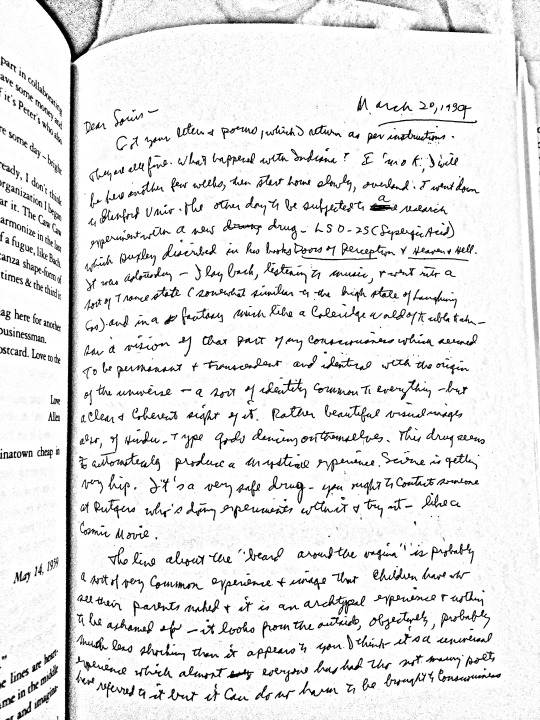
2.
As the 50s turned into the 60s, the Beat ethos into flower power, Kerouac drifted into Long Island alcoholism; Ginsberg adapted, stayed relevant. The transition between decades bridged by the Merry Pranksters’ cross-country quest to "tune out, drop out" in a refurbished 1939 school bus per Wolfe’s Electric Kool-Aid Acid Test.
On assignment for The Saturday Evening Post, Joan Didion traveled to the Haight-Ashbury district of San Francisco, where she saw posters of Ginsberg hung on the walls and devotees treated his opinions on the Krishna as of equal authority with the Swami. Didion saw a world falling apart, spiritually and socially in crisis. People forget, so it's worth reminding that Didion was not a progressive in this era. She was a National Review contributor and a Goldwater voter. And while I have no problem with her political conservatism, it’s important to link “Slouching” with the general moral hysteria over longhairedness taking place at the time, a hysteria which contributed in large part to Nixon's presidential and Reagan's gubernatorial elections.
The central argument (or assumption, or presumption of “Slouching” is that San Francisco is home to a generation of children (some literally, some relative maturity) who have embarked on an extended bad trip (either literally or figuratively) from which they may not ever return. Affectless and out-of-it, they show emotion only when discussing, acquiring, or ingesting narcotics (peyote, acid, smack, crystal, amps, and a now-mysterious “STP”). “Pathetically unequipped" for the real world, they lack any serious political convictions or critical thinking abilities, instead swimming in self-delusion and macrobiotic diets.
I can't speak of Dideon's intent so I'll stick to her prose, sociopathic in its lack of empathy and interest. The essay’s divided into bits so that each section sports an ominous closing sentence cum punchline-zinger. Interviewees divide into strawmen or caricatures; none are depicted or explored as complex, flesh-and-blood human beings. Juvenile delinquents and drug dealers are picked as the primary representative spokespeople of a sizable neighborhood and subculture. There’s Debbie, 15, a runaway because “[her] parents said she had to go to Church.” There’s John, 16, who has left home because his mother “didn't like boots” and made him help out around the house: “Tell about the chores,” Debbie says. John: “For example, I had chores. If I didn't finish ironing my shirts for the week I couldn't go out for the weekend. It was weird, wow.” Shortly after her wide-eyed relay on chores, Didion recounts Debbie literally chipping a nail, then getting upset that the author isn't carrying extra polish on her. I'd say you can't make this stuff up, but I'm tempted to invoke Richard Bradley:
Some years ago, when I was an editor at George magazine, I was unfortunate enough to work with the writer Stephen Glass on a number of articles. They proved to be fake, filled with fabrications, as was pretty much all of his work. The experience was painful but educational; it forced me to examine how easily I had been duped. Why did I believe those insinuations about Bill Clinton-friend Vernon Jordan being a lech? About the dubious ethics of uber-fundraiser (now Virginia governor) Terry McAuliffe? The answer, I had to admit, was because they corroborated my pre-existing biases. I was well on the way to believing that Vernon Jordan was a philanderer, for example—everyone seemed to think so, back in the ’90s, during the Monica Lewinsky time.
I can't say whether Didion fabricated these stories. It doesn't matter either way. A piece which confirms existing biases of its readers, or which confirms its own initial biases at its start, doing little more than elaborate variations on a stereotype for thousands of words, is poor criticism and shoddy historiography.
A generic structure for a given section of “Slouching”: observe events unraveling around her, hazard a guess at (and editorialize heavily on) what is occurring, entertain the possibility of asking a participant or knowledgeable observer for more accurate information, and then—inexplicably—decide not to. In other words, there’s a lack of respect for her subjects’ subjectivity, or for her own ability to be wrong. Equally as incredible as this journalistic practice is Didion’s willingness to admit to it (and in the same breath berate Time and other publications for their own misunderstandings of the hippie phenomenon).
Didion gets haughty at points, seamlessly transitioning from picking on a teenager’s amateur poetry to a bout of philosophical reflection:
As it happens, I am still committed to the idea that the ability to think for one's self depends upon mastery of the language and I am not optimistic about children who will settle for saying, to indicate that their mother and father do not live together, that they come from a “broken home.”
For myself, I’m not so hot about the idea of a journalist who dedicates forty pages to belittling literal teenage runaways, especially when so many avenues of more substantial cultural interest are ignored. It’s off-handedly mentioned that McLuhan is read by many in the Haight community, as are the Hari Krishna and the writings of Zen Buddhism, but Didion never meaningfully pursues any of the community's beliefs.
3.
Some of the more interesting documents on this subject come from the exchanges between literary, Cold War liberal moderates and the generation of beatniks and hippies who were pulling the country toward a more radical vision. Adam Kirsch’s Why Trilling Matters charts the relationship between Lionel Trilling and his former student at Columbia, Allen Ginsberg. (Kirsch, drawing on Trilling, distinguishes between the Blakean and Wordsworthean impulse, Wordsworth a “representative of wisdom,” Blake as the blazing voice of passion. As Trilling writes, Blake's poetry would be one of the more significant influences on the art and voice of Sixties counterculture: “American undergraduates seem to be ever more alienated from the general body of English literature, but they have for some time made an exception of William Blake... uniquely relevant to their spiritual aspirations” and acting as a model for its “transvaluation of social and aesthetic values.”)
Equally good is the lifelong correspondence between Allen and his also-poet father Louis Ginsberg. Trilling and L.’s sensibilities are of moderation and qualification, both sure only of their own fallibility; the Blakean hubris is an ideology propping up conceits of heroism, a Manichean dualism where only the counterculture keeps it real. “Save me from that mixed-up, confused view of the Beat Generation which maintains it has a blueprint of Truth, obviously handed over to them in a mystic, blinding revelation from Heaven," Louis wrote to his son in ‘58.
An avid communist in the early-to-mid 1960s (before a trip to Cuba changed his mind w/r/t the freedom of its citizens¹) Allen berated his father in letter after letter over Lou's democratic socialist views, and got bit back:
Your holier-than-thou attitude, with your noble intentions, does not prove that you have a Heavenly blueprint of the truth. You may be a great poet, as I believe you are, but you can still have false ideas and false facts, despite your noble intentions. T.S. Eliot and Pound had Fascist ideas.
One more excerpt, for joy:
Dear Allen,
You have a right to your opinion, according to your lights; but I retain my energetic insistence to differ with you... on your whole Beat Generation's views that everything that is, to paraphrase Pope, is wrong. Everything, according to your views, is all wrong, all in ruins, all warmongering, all immoral—except you (plural; i.e., the Beat Generation). Nobody wants “beauty, poetry, freedom” but you (plural)... all is false; all civilization messed up, all progress in the wrong, false track; all doomed... (March 10, 1958)
The truth the Beats claimed to seek or else contain was partly religious, the result of chemical visions, Ginsberg hearing Blake’s voice come to him mid-orgasm, Cassady meditating. But it was also of the writers’ attempted escape from social structure, to chase an idea of the authentic self as the self unencumbered by the social. Trilling “...the idea of... surrendering oneself to experience without regard to... conventional morality, of escaping wholly from the societal bonds, is an ‘element’ somewhere in the mind of every modern person.” Hence the enormous success of On the Road, which functions as simulation, a virtual joyride for those unwilling, unable, or who know better than to take such a trip themselves.
4.
Morris Dickstein, Gates of Eden:
Postwar prosperity had provided [sixties radicals] with the freedom to protest, the freedom to run wild, and the luxury of dropping out without worrying about a job. But by the 1970s the economy turned sour and, as I wrote in [the 1977 edition of] this book, “we could see how much the rainbow colors of the culture of the sixties were built on the fragile bubble of a despised affluence, an economic boom that was simply taken for granted.”
This is not to invalidate the legitimacy of radicals’ complaints, but to complicate the picture of inheritance in dissent.
It’s no secret the Beats were a stretch short of sainthood. Cassady and Kerouac were philanderers, promising women marriages only to subsequently abandon them (illegitimate children included). Cars were stolen only to be drunkenly totaled. And Carr, of course, infamously knifed an overly attached romantic pursuer in Manhattan's Riverside Park, dumping his body in the Hudson River under conditions still unclear today.
Tied up in this transgressiveness is the question of privilege, a critique which Diana Trilling, wife of the famous Lionel, launches in her essay for Partisan Review, “The Other Night at Columbia”:
I had heard about [Ginsberg] much more than I usually hear of students for the simple reason that he got into a great deal of trouble which involved his instructors, and had to be rescued and revived and restored; eventually he had even to be kept out of jail. Of course there was always the question, should this young man be rescued, should he be restored? There was even the question, shouldn’t he go to jail? We argued about it some at home but the discussion, I’m afraid, was academic, despite my old resistance to the idea that people like Ginsberg had the right to ask and receive preferential treatment just because they read Rimbaud and Gide and undertook to put words on paper themselves.
Alexander:
The “heroes” of On The Road consider themselves ill-done by and beaten-down. But they are people who can go anywhere they want for free, get a job any time they want, hook up with any girl in the country, and be so clueless about the world that they’re pretty sure being a 1950s black person is a laugh a minute. On The Road seems to be a picture of a high-trust society. Drivers assume hitchhikers are trustworthy and will take them anywhere. Women assume men are trustworthy and will accept any promise. Employers assume workers are trustworthy and don’t bother with background checks. It’s pretty neat. But On The Road is, most importantly, a picture of a high-trust society collapsing. And it’s collapsing precisely because the book’s protagonists are going around defecting against everyone they meet at a hundred ten miles an hour.
I would hesitate to agree that America in the early 20th century was markedly higher-trust than modern times. Rates of violent crime in the interwar period are comparable to the highs of the 70s crime wave, and despite sagging post-1945, were only slightly lower in Kerouac's time than our own. (Trust != crime, I know.) But the mechanisms of opportunity and exploitation remain in play. It is a phenomenon in which transgressive parties advocate for their transgressive way of life as a replacement to the present social order, without realizing or acknowledging that their transgressions are logistically possible through this very structure. Behavior is advocated as moral in Beat writing which would fall apart as a Kantian imperative.
In Kerouac this is both identitarian and pragmatic; J.K.’s lifestyle is possible because it exploits a trusting industrial society and its hard-earned resources. But in Maggie Nelson’s queer theory, it’s primarily a matter of identity and spirituality, where transgression is an end (autotelic) in itself. This is the paradoxical relationship of hegemony to the queer: it is at once mortal enemy and dearest ally, struggle’s basis in every sense of the word.
The Argonauts is frequently brilliant; its idea of flux (“a constant becoming which never becomes”) is infinitely valuable. But Nelson condemns at every turn the category, the pigeon-hole, the label. Words to her are cages which imprison minds and bodies. And yet both Nelson and Kerouac seem not to acknowledge that the lifestyles and self-images they hold so valuable—the rebellion, transgression, and self-elevation practiced by Kerouac; the queerness valued by Nelson—are possible only through the existence of a majority body or structure from which to self-elevate and self-other. They are advocating for identities of negation as if they were autonomous.
[1] Ginsberg was expelled from Cuba in February of 1965 for "talking too much about marijuana & sex & capital punishment"; he traveled from there to the less oppressive Czechoslovakia.
#jack kerouac#joan didion#allen ginsberg#william blake#adam kirsch#lionel trilling#maggie nelson#scott alexander#slate star codex
1 note
·
View note